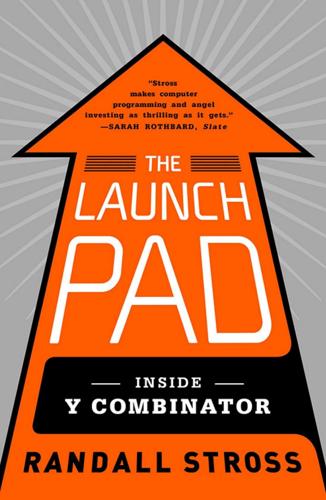
The Launch Pad: Inside Y Combinator, Silicon Valley's Most Exclusive School for Startups
by
Randall Stross
Published 4 Sep 2013
Their examples offer hope to others who would like to try to acquire some programming skills at an age when it will not come as easily as it does to the young. Even if Marc Andreessen’s phrase Software is eating the world is not at the tip of everyone’s tongue, an inchoate sense of software’s centrality is widely understood. The warm reception that greeted Codecademy at its debut speaks to a broad yearning to be a participant in, and not remain a passive bystander to, the spread of software everywhere. All beginnings embody hope, and Y Combinator gives birth to beginnings by the dozens—with the propulsive power of Software is eating the world at their backs. This gives the group portrait a most hopeful cast. Like newly minted graduates, the founders step out into the daylight with nothing but possibility ahead.
…
For Rebecca, Martin, Jacob, and Alex CONTENTS Title Page Copyright Dedication INTRODUCTION 1 YOUNGER 2 OLDER 3 GRAD SCHOOL 4 MALE 5 CRAZY BUT NORMAL 6 UNSEXY 7 GENIUS 8 ANGELS 9 ALWAYS BE CLOSING 10 CLONE MYSELF 11 WHAT’S UP? 12 HACKATHON 13 NEW IDEAS 14 RISK 15 MARRIED 16 FEARSOME 17 PAY ATTENTION 18 GROWTH 19 FIND A DROPBOX 20 DON’T QUIT 21 SOFTWARE IS EATING THE WORLD Epilogue Acknowledgments Appendix: The Summer 2011 Batch Notes Index INTRODUCTION San Francisco Gray Line is the largest sightseeing tour company in Northern California. It offers tours of San Francisco, of Muir Woods and Sausalito or the wine country north of the city, but it no longer offers a tour of Silicon Valley, immediately south.
…
There are literally thousands of startups, dispersed along the sixty-mile corridor that extends between San Francisco and San Jose, but they all operate under secrecy until they are ready to launch their first product. That’s why there can never be a Gray Line tour of Silicon Valley’s future. It’s a shame, because this place is creating everyone’s future. Software is eating the world—the venture capitalist Marc Andreessen has come up with a rather catchy way of describing the disruption, under way or coming soon, to industries seemingly distant from the tech world. Software-based startups will do much of the disrupting. They take advantage of cloud-based Internet services that make computing power a utility, easily tapped, and whose cost has dropped a hundredfold in the ten years since first introduced.
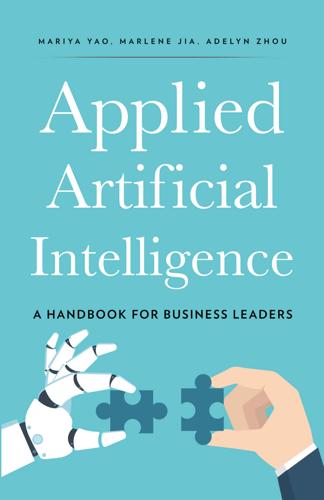
Applied Artificial Intelligence: A Handbook for Business Leaders
by
Mariya Yao
,
Adelyn Zhou
and
Marlene Jia
Published 1 Jun 2018
You’ll want to include a theoretical introduction to help them separate hype from reality and also hands-on experience to help them understand both the limitations and potential of AI implementations in a corporate setting. To learn more about our executive education offerings, visit appliedaibook.com/education. * * * (41) Andreessen, M. (2011, August 20). Why Software Is Eating the World. Wall Street Journal. Retrieved from https://goo.gl/woxq8c (42) Lardinois, F. (2016, September 26). Microsoft CEO Satya Nadella on how AI will transform his company. Tech Crunch. Retrieved from http://techcrunch.com/2016/09/26/microsoft-ceo-satya-nadella-on-how-ai-will-transformhis-company/ (43) D’Onfro, J. (2016, April 28).
…
These tech companies often know more than you do about what your customers search for, what they buy, what they say, who they interact with, where they are, and how they might behave in the future. Their expertise has helped them to grow rapidly with high profit margins, overwhelming less tech-savvy competitors in the process. Technology companies may not compete directly with you today, but heed prominent venture capitalist Marc Andreessen's warning that “software is eating the world."(61) As consumers opt for the convenience of Amazon Prime and investors question other companies’ abilities to compete against the “Amazon Effect," retailers across a wide range of industries have seen their profits and stock values decline.(62) Amazon has even launched private labels for popular product categories that directly compete for market share with third-party sellers on their own platform.(63) Web traffic and advertising revenues have plummeted at many online media publishers.(64) Even though digital advertising spending is growing, Google and Facebook present a duopoly that captured 85 percent of the new growth in the first quarter of 2016.(65) Technological superiority alone cannot account for success.
…
Constantly switching true north metrics will confuse your team and hinder your execution. * * * (60) Baran, B., Di, W., Li, M., & Yuan, C.-Y. (2018, March 6). Big data analytics and machine learning techniques to drive and grow business. Symposium conducted at the Strata Data Conference, San Jose. (61) Andreessen, M. (2011, August 20). Why Software Is Eating the World [Editorial]. Wall Street Journal Retrieved from https://www.wsj.com/articles/SB10001424053111903480904576512250915629460 (62) Gold, R., & Chaudhuri, S. (2017, September 28). ‘Amazon Effect’ Leads Investors to Sour on Global Retail. The Wall Street Journal. Retrieved from http://www.wsj.com/articles/amazon-effect-leads-investors-to-sour-onretail-1506591003 (63) Perez, S. (2016, November 3).
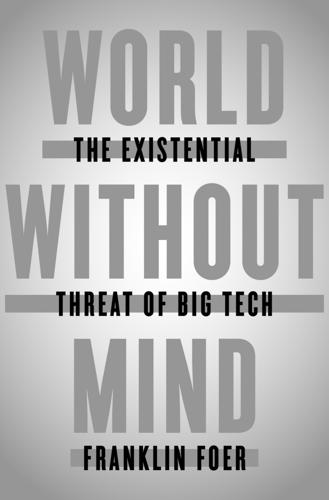
World Without Mind: The Existential Threat of Big Tech
by
Franklin Foer
Published 31 Aug 2017
“radical transparency” or “ultimate transparency”: Kirkpatrick, 209. “The days of you having a different image for your work friends”: Kirkpatrick, 199. “To get people to this point where there’s more openness”: Kirkpatrick, 200. “In a lot of ways Facebook is more like a government”: Kirkpatrick, 254. “Software is eating the world”: Marc Andreessen, “Why Software Is Eating the World,” Wall Street Journal, August 20, 2011. “You have to make words less human”: Laura M. Holson, “Putting a Bolder Face on Google,” New York Times, February 8, 2009. “You know I’m an engineer”: Ben Thompson, “Why Twitter Must Be Saved,” Stratechery, November 8, 2016.
…
A very different version of this dream, however, has come to fruition, in the form of the CEOs of the big tech companies. We’re not ruled by engineers, not yet, but they have become the dominant force in American life, the highest, most influential tier of our elite. Marc Andreessen coined a famous aphorism that holds, “Software is eating the world.” There’s a bit of obfuscation in that formula—it’s really the authors of software who are eating the world. There’s another way to describe this historical progression. Automation has come in waves. During the Industrial Revolution, machinery replaced manual workers. At first machines required human operators.
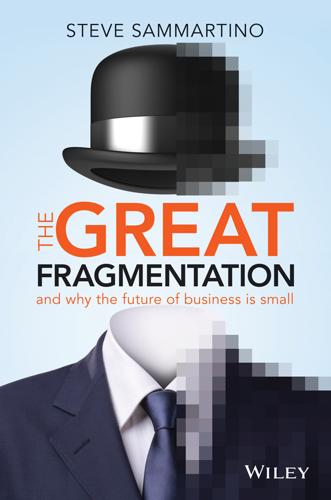
The Great Fragmentation: And Why the Future of All Business Is Small
by
Steve Sammartino
Published 25 Jun 2014
The assumption is that the market is known and defined. It’s a linear factory mindset and it’s no longer applicable. In times of revolution, as markets evolve rapidly, companies need to widen their perspective and focus on customer-need states. Software is eating the world Inventor of the first graphical web browser ‘Mosaic’ and now venture capitalist Marc Andresseen famously said that ‘software is eating the world’. His inference is that any industry that can be disrupted by the use of software, will be and that all industries are being attacked by a new breed of entrepreneur — the four-dollar tech startups, as I like to call them.
…
Friday night lights Yes, but it’s different Emotions + incentive = shaped behaviour People won’t share that stuff Bursting into reality Rising realism Doing > having The gaming mentality The sixth sense Our decentralised nervous system Start making sense Product = computer Mash-up heaven The seed is planted Not if, but when and who Chapter 15: System hacking: a great idea with a bad reputation Hacking defined Hacker culture Hacking is inevitable Retail hacking Industry hacking My favourite media hack Why we have to self-hack Step forward MOOCs Yes, but they’re not-for-profits Chapter 16: The job, the factory and the home: how location follows technology From the city, to the suburbs, to wherever Along came Henry The end of offices History repeats Work options Offices, control and profits A better office offer Idea diffusion The office is not immune The last industrial relic Chapter 17: A stranger from Romania: building a real Lego car A new low for the internet Digital tenacity Marketing rocket science The Super Awesome Micro Project The hourglass strategy The human motive An open-ended strategy Chapter 18: Market-share folly and industrial fragmentation: industrial metrics Market-share folly The key assumption = we know the market Software is eating the world Did they see them coming? Redefining industries through infrastructure Collaboration with competitors We’ll just buy the winners The pace of change Internal venture capital Cold War era thinking Ignore resources and self-disrupt Chapter 19: The externality reality: is this the end of privacy?
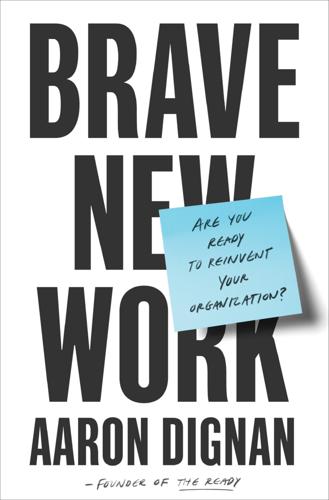
Brave New Work: Are You Ready to Reinvent Your Organization?
by
Aaron Dignan
Published 1 Feb 2019
The average number of companies: Adrian Wooldridge, “America can’t control the global flow of ideas,” The Economist, September 13, 2018, www.economist.com/business/2017/04/22/why-the-decline-in-the-number-of-listed-american-firms-matters. value of just $438 million: Alex Wilhelm, “A Look Back in IPO: Amazon’s 1997 Move,” TechCrunch, June 28, 2017, https://techcrunch.com/2017/06/28/a-look-back-at-amazons-1997-ipo. “software is eating the world”: Marc Andreessen, “Why Software Is Eating the World,” The Wall Street Journal, August 20, 2011, www.wsj.com/articles/SB10001424053111903480904576512250915629460. gone in the next ten years: Michael Grothaus, “Bet You Didn’t See This Coming: 10 Jobs That Will Be Replaced by Robots,” Fast Company, January 19, 2017, www.fastcompany.com/3067279/you-didnt-see-this-coming-10-jobs-that-will-be-replaced-by-robots.
…
An old Henry Ford quote best sums up my feelings on this question: “Whether you believe you can do a thing or not, you are right.” Will there be enough work for everyone? If organizations get smaller and technology grows ever more capable, what will we all do all day? Artificial intelligence, robotics, and automation are reshaping the workforce as we speak. When Marc Andreessen said that “software is eating the world,” he wasn’t kidding. Everywhere you look, the complicated work is becoming the domain of technology. The bots in my company already do the work of a couple people—handling everything from collecting feedback to scheduling meetings. Self-driving trucks such as the one Tesla is developing threaten the livelihoods of many more.

Vassal State
by
Angus Hanton
Published 25 Mar 2024
v=oME2I09Pzpg&ab_channel=TheWorldUncovered. 36 Ali Montag, ‘Jeff Bezos’ first desk at Amazon was a door with four-by-fours for legs – here’s why it still is today’, CNBC Make It [website] (23 January 2018), https://www.cnbc.com/2018/01/23/jeff-bezos-first-desk-at-amazon-was-made-of-a-wooden-door.html. 37 ‘Elon Musk: no change to Twitter moderation policy yet’, BBC News [website] (29 October 2022), https://www.bbc.co.uk/news/business-63428848. 38 ‘How to create a pitch deck in one day’, Founders Network [website], https://foundersnetwork.com/blog/how-to-create-a-pitch-deck-in-one-day/. 39 ‘Competition is for losers with Peter Thiel (how to start a startup 2014: 5)’ [video], YouTube [website] (22 March 2017), https://www.youtube.com/watch?v=3Fx5Q8xGU8k&ab_channel=YCombinator. 40 Marc Andreessen, ‘Why software is eating the world’, Andreessen Horowitz [website] (20 August 2011), https://a16z.com/why-software-is-eating-the-world/. 41 ‘Seven ways platform workers are fighting back’ [PDF], TUC [website], p. 3, https://www.tuc.org.uk/sites/default/files/2021-11/PlatformEssaysWithPollingData2.pdf. 42 Robert Booth, ‘Gig economy threatens government finances, says May adviser’, Guardian [website] (30 November 2016), https://www.theguardian.com/business/2016/nov/30/gig-economy-threatens-government-finances-says-may-adviser. 5.
…
In the short term this offers a reliable platform on which accountants can store and process client data, but in the longer term their clients are locked into paying an annual or monthly toll charge. One of the most successful investors in Silicon Valley, Marc Andreessen, famously wrote that ‘software is eating the world’, predicting, back in 2011, that West Coast companies would disrupt most traditional industries.40 Silicon Valley is still eating the UK byte by byte, one transaction at a time. Labour as a commodity, brokered from California While digital platforms now dominate the markets in goods and services, they are also transforming the labour market.
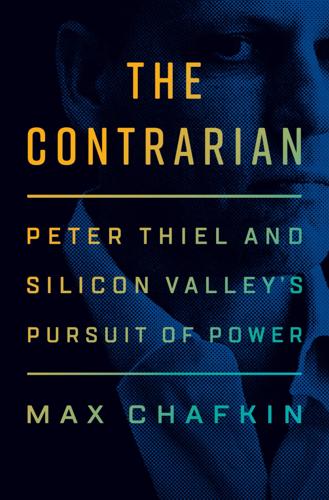
The Contrarian: Peter Thiel and Silicon Valley's Pursuit of Power
by
Max Chafkin
Published 14 Sep 2021
and ultimately flawed: Riley Beggin, “Report: The CDC Contaminated Its First Coronavirus Tests, Setting US Back,” Vox, April, 18, 2020, https://www.vox.com/2020/4/18/21226372/coronavirus-tests-cdc-contaminated-delay-testing. “Software is eating the world”: Marc Andreessen, “Why Software Is Eating the World,” Andreessen Horowitz, August 20, 2011, https://a16z.com/2011/08/20/why-software-is-eating-the-world/. two more contracts, worth $25 million: Dave Nyczepir, “HHS Cites Coronavirus ‘Urgency’ in Speedy Palantir Contract Awards,” FedScoop, May 8, 2020, https://www.fedscoop.com/hha-covid-funds-palantir/. former CDC director accused: Charles Ornstein, “Out of View: After Public Outcry CDC Adds Hospital Data Back to Its Website—for Now,” ProPublica, July 16, 2020, https://www.propublica.org/article/out-of-view-after-public-outcry-cdc-adds-hospital-data-back-to-its-website-for-now.
…
This put the United States roughly six weeks behind South Korea, which arrested its own outbreak quickly. And then there was Silicon Valley. Factory workers had been laid off, restaurants had closed, shopping malls were abandoned—but the world that Peter Thiel inhabited was absolutely booming. All the predictions about the ways that technology would subsume aspects of our lives—“Software is eating the world,” as the venture capitalist Marc Andreessen famously put it—were suddenly, forcefully, coming true. Every primary and secondary school in America suddenly needed a Zoom account, and every child needed a tablet. Amazon sales—on everything from cloth bandanas to 1,000-piece jigsaw puzzles—spiked so dramatically that the company had to triage its shipping times.
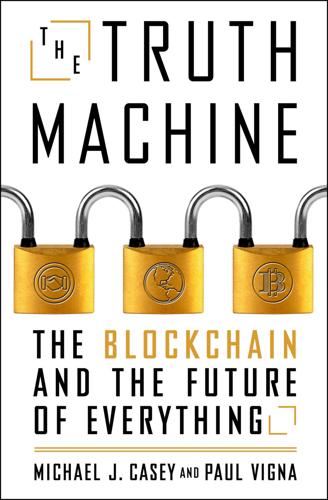
The Truth Machine: The Blockchain and the Future of Everything
by
Paul Vigna
and
Michael J. Casey
Published 27 Feb 2018
Here’s how Chris Allen, a research scientist at bitcoin infrastructure: Chris Allen, “The Path to Self-Sovereign Identity,” Life with Alacrity blog, April 25, 2016, http://www.lifewithalacrity.com/2016/04/the-path-to-self-soverereign-identity.html. CHAPTER NINE “Software is eating the world”: Marc Andreessen, “Why Software Is Eating the World,” The Wall Street Journal, August 20, 2011, https://www.wsj.com/articles/SB10001424053111903480904576512250915629460. “Unless we understand better how technologies…”: S. Jasanoff, The Ethics of Invention: Technology and the Human Future (W. W. Norton, 2016). In his 1891 essay “The Soul of Man under Socialism”: Oscar Wilde, “The Soul of Man under Socialism,” First publication in Fortnightly Review, February 1891, p. 292.
…
But this shift to decentralized trust, along with all other disruption coming from, you name it—self-driving cars, automated medicine, peer-to-peer credit, 3D printing, artificially intelligent writers—will be too big to keep up with. The idea that the office towers of New York and Chicago will be left half empty for decades is not unfeasible. “Software is eating the world,” as Marc Andreessen likes to say. It’s not just the loss of jobs that’s the problem. It’s also the broader problem of letting algorithms decide what our world looks like. The priorities, preferences, and prejudices of software designers are baked into the code they write, whether it’s the program that dictates which passengers Uber drivers pick up or the incentive model in the Bitcoin protocol.
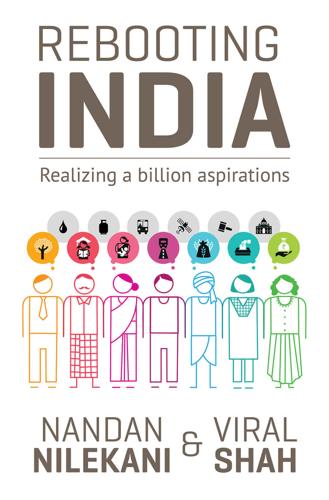
Rebooting India: Realizing a Billion Aspirations
by
Nandan Nilekani
Published 4 Feb 2016
Conservative back-of-the envelope calculations find those savings to be equivalent to 1 per cent of our GDP—enough for two Golden Quadrilateral road systems across the country every year,2 or to send 200 Mangalyaan missions to Mars annually.3 One year’s savings are also sufficient to provide minimal health insurance for every family in the country for three years.4 Software is eating the world In 2011, Marc Andreessen, the co-founder of Netscape, famously proclaimed, ‘Software is eating the world. More and more major businesses and industries are being run on software and delivered as online services—from movies to agriculture to national defence. Many of the winners are Silicon Valley-style entrepreneurial technology companies that are invading and overturning established industry structures.’5 For the most part, these businesses and services have come into existence only in the last decade, but have transformed our social landscape to the point that we now wonder how we ever got by without them.
…
Bagla, Pallava. 23 September 2014. ‘Mangalyaan, the cheapest Mars mission ever’. NDTV. http://www.ndtv.com/india-news/mangalyaan-the-cheapest-mars-mission-ever-66974 4. Rashtriya Swasthya Bima Yojana. http://www.rsby.gov.in/about_rsby.aspx 5. Andreessen, Marc. 20 August 2011. ‘ Why Software Is Eating the World’. The Wall Street Journal. http://www.wsj.com/articles/SB10001424053111903480904576512250915629460 6. Saran, Rohit. 26 December 2005. ‘1995: Cell phones arrive’. India Today. http://indiatoday.intoday.in/story/bengal-cm-jyoti-basu-made-indias-first-cell-phone-call-to-telecom-minister-sukh-ram-in-1995/1/192421.html 7.
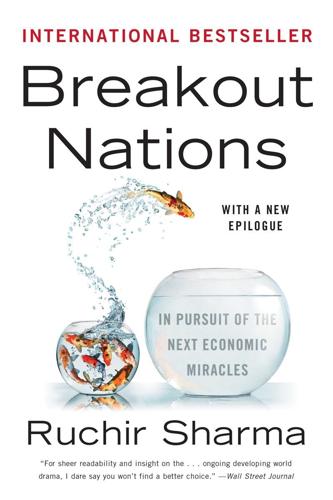
Breakout Nations: In Pursuit of the Next Economic Miracles
by
Ruchir Sharma
Published 8 Apr 2012
While Apple employs fifty thousand people and has a market capitalization that has risen fivefold over the last five years, the Taiwan companies that make gadgets for Apple employ millions but have seen their stock prices stagnate for lack of pricing power. The hardware is easy to replicate, which in turn cuts profit margins, while the software is highly profitable so long as it continues to evolve. Netscape founder Marc Andreessen has argued, in a Wall Street Journal essay called “Why Software Is Eating the World,” that two decades after the invention of the modern Internet, and a decade after the collapse of the Internet bubble, the software industry is at last reaching critical mass. The technology required to transform industries through software finally works and is accessible. Two billion people have access to broadband, and by the end of the decade, Andreessen predicts, five billion will have access to the Internet through smart phones.
…
“Sri Lanka’s Constitutional Amendment: Eighteenth Time Unlucky.” Economist, September 9, 2010. http://www.economist.com/node/1699214 “Sri Lanka’s War: Two Years On.” Economist, May 19, 2011. http://www.economist.com/blogs/banyan/2011/05/sri_lankas_war 13: After the Ecstasy, the Laundry Andreessen, Marc. “Why Software Is Eating the World.” Wall Street Journal, August 13, 2011. http://online.wsj.com/article/SB10001424053111903480904576512250915629460.html CLSA Asia-Pacific Markets. 2020 Innovation: Pulling the Future towards US. November 2011. Commission on Growth and Development. The Growth Report: Strategies for Sustained Growth and Inclusive Development.
…
Agency for International Development (USAID), 195, 197, 198 utilities, 75, 164–65, 177, 201, 206–7, 209, 212–13 Uttar Pradesh, 37, 49, 52, 79 vasectomies, 55–56 Velvet Revolution, 103 Venezuela, 89, 190, 214–15 venture capital, 238 Vestel, 120 videos sales, 211 Vienna, 104 Vietnam, 198–204 banking in, 202 China compared with, 30, 199, 200–203, 204 Communist regime of, 199–200, 203 economy of, 30, 198–99 foreign investment in, 198–200, 201, 203–4 growth rate of, 157, 201–2, 204 income levels in, 204 inflation rate in, 202, 248 infrastructure of, 199, 200–201 labor market in, 199, 203–4 oil industry of, 200–201 population of, 199 stock market of, 198–99, 202 Vietnam War, 199, 203 visas, 79, 94, 125 vodka, 90 Vogue, 53 Volkswagen, 103 Volvo, 144 wage levels, 7, 21, 22, 23, 24, 29, 42, 62, 65, 80, 87–88, 109, 132, 137, 179, 180, 248 Wall Street, viii–ix, 1–2, 8, 86, 89, 227, 243 Wall Street Journal, 21, 237, 238–39 Wang, Haiyan, 237 warranties, 162 Warsaw, 97, 98, 103–4 wealth, vii–viii, 8, 12–13, 25, 31–32, 42, 44–47, 45, 57, 71, 76, 79, 91, 98, 103, 131–38, 142, 148, 169, 173, 175, 176, 177, 178–79, 236, 254 see also billionaires welfare programs, x, 10, 41–42, 61, 63, 72, 87–88, 126–27, 175, 181–83 Wen Jiabao, 17 West Bengal, 37 Western Cape, 175 Western civilization, viii–xix, 6, 7, 8, 12, 13, 241–47 “whack a mole” game, 68 wheat, 83, 232 white-collar workers, 169 “white Turks,” 125 “Why Software Is Eating the World” (Andreessen), 238–39 Wilkinson, Ben, 203 wireless networks, 10 Woju, 24 women, 21, 24, 31, 106, 145, 169, 220 Worker’s Party, 66 World Bank, 7, 85, 94, 194, 235 World Cup (2010), 177 World Cup (2022), 219 World Economic Forum, 176, 178 World Trade Organization (WTO), 29 World War I, 114, 194 World War II, 97, 169, 252–53 Xie, Andy, 251–52 Xinjiang, 53 Yar’Adua, Umaru, 210 Year of Living Dangerously, The, 129 Yeltsin, Boris, 85, 86, 91, 103 Yemen, 10, 216 yen, 32–33 YouTube, 167 Yugo, 161 Yugoslavia, 161 Zambia, 184 zero earnings, 3 Zille, Helen, 175–76 Zimbabwe, 4, 171, 173, 181 Zulus, 176 Zuma, Jacob, 176 Zynga, 239 More praise for Breakout Nations “A penetrating look at the countries he believes are likely to flourish, or fail, in the years ahead. . . .
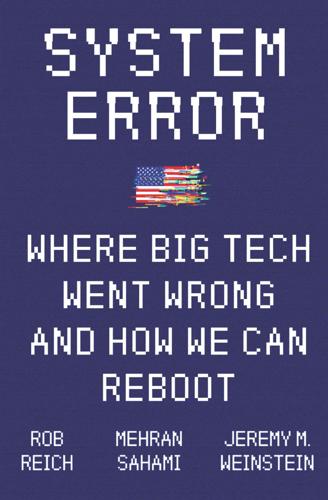
System Error: Where Big Tech Went Wrong and How We Can Reboot
by
Rob Reich
,
Mehran Sahami
and
Jeremy M. Weinstein
Published 6 Sep 2021
Marc Andreessen would swap the jeans he had worn on the cover of Time for a sports jacket, founding the venture capital firm Andreessen Horowitz with his longtime colleague Ben Horowitz in 2009. Their firm would become an investor in Twitter, Instagram, Facebook, Pinterest, Lyft, and Airbnb. In an oft-quoted 2011 piece in the Wall Street Journal, “Why Software Is Eating the World,” Andreessen explained how the capital needs of tech companies had changed: On the back end, software programming tools and Internet-based services make it easy to launch new global software-powered start-ups in many industries—without the need to invest in new infrastructure and train new employees.
…
the tenth largest economy: Charles E. Eesley and William F. Miller, “Impact: Stanford University’s Economic Impact via Innovation and Entrepreneurship,” Foundations and Trends in Entrepreneurship 14, no. 2 (2018): 130–278, https://doi.org/10.1561/0300000074. “On the back end”: Marc Andreessen, “Why Software Is Eating the World,” Wall Street Journal, August 20, 2011, https://online.wsj.com/article/SB10001424053111903480904576512250915629460.html. “most investments fail”: Dave McClure, “99 VC Problems but a Batch Ain’t 1: Why Portfolio Size Matters for Returns,” Medium, August 31, 2015, https://500hats.com/99-vc-problems-but-a-batch-ain-t-one-why-portfolio-size-matters-for-returns-16cf556d4af0.
…
See also Y Combinator start-up mindset, xxi “Statement on the Purpose of a Corporation” (Business Roundtable), 181 Stiglitz, Joseph, 254 stock options, 26–28 substantive fairness, 92–93 success disasters, 20–21 Sundar Pichai, 64–65 Sundararajan, Arun, 49 Sunflower Movement, Taiwan, 242 supervised data, 85–86 Supreme Court of the United States, 199, 201 surveillance capitalism, 115, 121–22 surveillance society, 151 surveillance technologies, 21, 112, 113–14, 125–26 Swartz, Aaron, xxi–xxvi, 44 Sweeney, Latanya, 130 Swift, Taylor, 111–12 systemic problems in a democracy, 239–43 Taiwan, 242–43, 261–62 Tang, Audrey, 242–43 Taylor, Frederick, and Taylorism, 14 technological innovation overview, 240 balancing the competing values created by, 240–43, 258 Clipper Chip technology, 115–16 deceleration in, 52 democratic resolution of rival values, xxxiii–xxxiv externalities created by, xxvii failure to examine potential societal harm, xxi and governance, 52–53 insider argument for a reflective stance, 254 instant wealth as a priority, xxv–xxvi maximizing benefits while minimizing harms, xiii–xiv, 65 See also algorithmic decision-making; governance; innovation technological unemployment, 174–76 technologists enablers of, xxviii funding for OpenAI’, 234 governing us vs. governing them, xxviii–xxix, 68–69, 257–63 lack of diversity, 17, 41 legislative ignorance of, 66–68 libertarian tendencies, 25, 52, 67 new masters of the universe, 22–23 optimizing facial recognition software, 17 small group of humans make choices for all of us, 11, 25–26 transforming education to create civic-minded technologists, 251 See also optimization mindset technology, 21, 53–59, 169, 174, 237–39 Telecommunications Act (1996), 60, 61, 62 telegraph, 56–57 telephone system, 60 Terman, Frederick, 28–29 terrorist attack, San Bernardino, California, 72 Theranos, xxx Thiel, Peter, 28, 38, 42, 52 Thrun, Sebastian, 154 Time magazine, 30 transparency of algorithmic decisions, 105, 107–9 and control, 134 Facebook Oversight Board, 215–16 requiring internet platforms to disclose information on credibility of sources, 225–26 “Traveling Salesperson Problem” (TSP), 12–13 Triangle Waist Company fire in 1911, 53–55 Trolley Problem, the, 155 truck drivers and trucking industry, 175 Trump, Donald J., xi, 187–88, 215 Tuskegee experiment, xxxi Twitter as digital civic square, 21 leaders surprised by ways the platform could do harm, 254 Trump’s access denied after January 6, 2021, xi–xii, 187–88 See also big tech platforms ultimatum game, 91 unicorns, 37–38, 39, 43 United Kingdom, 165, 218, 254, 260–62 United Nations Development Programme (UNDP), 173 United States Postal Service, 3–4 universal basic income (UBI), 182–84, 185 University College London Jeremy Bentham display, 120–21, 124 unsupervised data, 85 US Air Force Academy, 103 US Capitol assault (Jan. 6, 2021), xi-xii, xxvi, 115, 187, 209, 215, 223 US Census Bureau, 41 US Department of Justice (DOJ), 257 US Federation of Worker Cooperatives, 180 US security forces and message encryption, 128–29 USA PATRIOT Act, 116 user engagement in online platforms, 40 user-centric privacy, 149–50 utilitarianism, 9, 121, 168, 245 Vacca, James, 104–5 values overview, xvii, xxix balancing the competing values created by innovation, 240–43, 258 expressing ourselves in support of each other, 178 free expression, democracy, individual dignity at risk online, 190–91 freedom as, 172–73 goals assessment for evaluating efficiency vs. values, 15–16 replacing governance by big tech with process of deciding, xxix resolving trade-offs between rival values, xxxi–xxxiii, 45 at risk from new, unregulated innovations, 56 of tech leaders as expert rulers, 67–68 See also dignity, fairness, free speech, privacy, safety, security Varian, Hal, 174 venture capital, inequality in distribution of, 41 venture capitalists (VCs), 25–49 ecosystem of, 31–33 funding Soylent, 8 funds as investment vehicles for their LPs, 38–39 hackers and, 28, 52, 68 high value exits, 40–41 increasing numbers of, 39 narrow view of success as white, male, nerd, 41 optimizing from multiple starting points, 43–45 and scalability of businesses, xxviii and Silicon Valley, 17, 26–28 at Stanford showcasing their new companies, 42–45 unicorns, search for, 37–38, 39, 43 Vestager, Margrethe, 252–53, 255 virtual reality, the experience machine, 167–69 Waal, Frans de, 92 Wales, Jimmy, 195 Walker, Darren, 180 Wall Street Journal, 42–43 Warren, Elizabeth, 181, 256 washing machines and laundry, 157–58 watch time metric, 34 Watchdog.net, xxiii Weapons of Math Destruction (O’Neil), 98 Weinberg, Gabriel, 135–36 Weinstein, Jeremy, xv–xvi, 72 Weld, William, 130 Western Union, 57 Westin, Alan, 137–38 WhatsApp, 127–28 Wheeler, Tom, 63, 76 Whitt, Richard, 149 “Why Software Is Eating the World” (Wall Street Journal), 42–43 Wikipedia, 195–96 Wikipedia conference, xxiii–xxiv Wilde, Oscar, 63 winner-take-all, disruption vs. democracy, 51–76 overview, 51–53 democracy and regulation of technology, 68–73 democracy as a guardrail, 73–76 government’s complicity in absence of regulation, 59–63 innovation vs. regulation, 53–59 and Plato’s philosopher kings, 63–68 Wisconsin’s COMPAS system, 88, 98 Wong, Nicole, 40, 254 worker cooperatives, 180 workers’ compensation benefit, 55 workplace safety, 53–54, 55 World Economic Forum 1996, Davos, Switzerland, 25 World Health Organization, 154 World Wide Web, 29, 30.
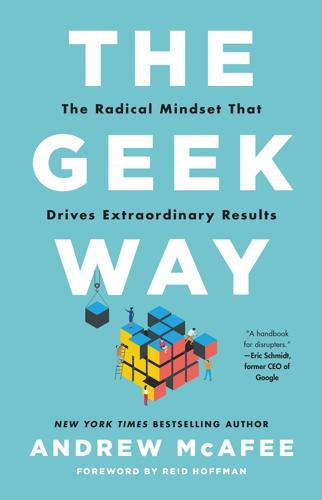
The Geek Way: The Radical Mindset That Drives Extraordinary Results
by
Andrew McAfee
Published 14 Nov 2023
Army Center of Military History, https://history.army.mil/html/bookshelves/resmat/desert-storm/index.html#:~:text=During%20air%20and%20ground%20operations,and%20105%20non%2Dhostile%20deaths. 85 “the Iraqi army collapsed”: Congressional Record, vol. 143, no. 37 (March 20, 1997), www.govinfo.gov/content/pkg/CREC-1997-03-20/html/CREC-1997-03-20-pt1-PgS2610-2.htm. 86 1991 testimony to Congress: “Colonel John Boyd on OODA, People, Ideas, and Technology” (user clip of “U.S. Military Reform After Oper. Desert Storm,” April 30, 1991), C-SPAN, December 23, 2019, www.c-span.org/video/?c4841785%2Fuser-clip-colonel-john-boyd-ooda-people-ideas-technology. 87 when software is eating the world: Marc Andreessen, “Why Software Is Eating the World,” Wall Street Journal, August 22, 2011, www.wsj.com/articles/SB10001424053111903480904576512250915629460. 88 As he left his job: Elisabeth Behrmann, “VW Software Issues Point to iOS and Android-Like Future for Cars,” Bloomberg, September 14, 2022, www.bloomberg.com/news/articles/2022-09-14/vw-software-issues-point-to-ios-and-android-like-future-for-cars.
…
Business geeks are obsessed with speed because in addition to all of its other benefits—disbanding liar’s clubs, mitigating the 90 percent syndrome, and increasing a team’s rate of learning and cultural evolution—it also disrupts and bewilders opponents. Many industrial-era companies simply can’t keep up with the geeks. These companies can’t update their software as quickly, which becomes a serious disadvantage at a time when software is eating the world. When embarking on product development efforts, industrial-era companies often plan extensively and jockey for status instead of building prototypes as quickly as possible. They behave, in short, like teams of MBAs do on the marshmallow challenge. Their geek competitors, on the other hand, act like kindergartners.
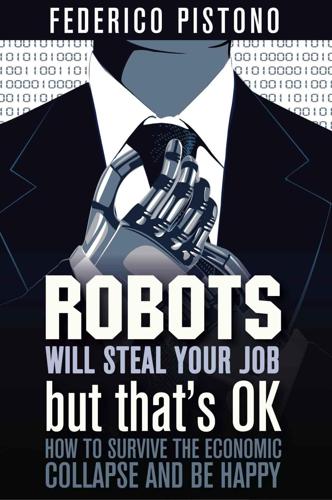
Robots Will Steal Your Job, But That's OK: How to Survive the Economic Collapse and Be Happy
by
Pistono, Federico
Published 14 Oct 2012
Foxconnn, Canon, they are only two of numerous examples. China is increasingly replacing its workers with robots, 54 and now even major newspapers are realising this. Just a few days ago (at the time of this writing), The New York Times came out with a 6-page piece entitled “The Machines Are Taking Over”,55 The Wall Street Journal says “Why Software Is Eating The World”,56 and I suspect these types of article will only increase in the near future. The trend is clear, companies in the manufacturing sector are automating, and the typical answer “people will find something else to do” is simply a cop-out that does not look at the reality of the situation – that change is happening too fast, and that most workers who will be replaced by machines will not have the time to learn new skills.
…
http://singularityhub.com/2012/06/06/canon-camera-factory-to-go-fully-automated-phase-out-human-workers/ 54 China Is Replacing Its Workers With Robots, 2012. Business Insider. http://www.businessinsider.com/credit-suisse-chinese-automation-boom-2012-8 55 The Machines Are Taking Over, Sep. 14, 2012. The New York Times http://www.nytimes.com/2012/09/16/magazine/how-computerized-tutors-are-learning-to-teach-humans.html 56 Why Software Is Eating The World, 2011. The Wall Street Journal. http://on.wsj.com/pC7IrX 57 In the TV series Star Trek, a replicator works by rearranging subatomic particles, which are abundant everywhere in the universe, to form molecules and arrange those molecules to form the object. For example, to create a pork chop, the replicator would first form atoms of carbon, hydrogen, nitrogen, etc., then arrange them into amino acids, proteins, and cells, and assemble the particles into the form of a pork chop.
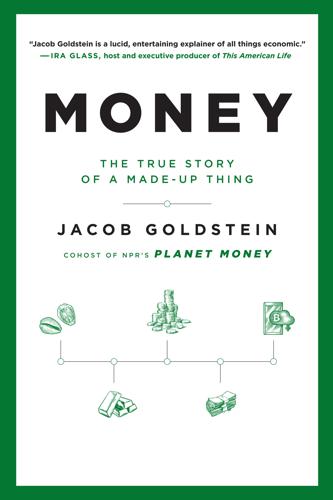
Money: The True Story of a Made-Up Thing
by
Jacob Goldstein
Published 14 Aug 2020
We celebrate people who create jobs, but in the long run, we get richer by destroying jobs—by figuring out how to do the same amount of work with fewer people. This is not quite a paradox (because there’s an eventual solution to the problem, which we’ll get to). But for the people caught up in the destruction, it sucks. We live in a moment when this tension is acute—when, as the venture capitalist Marc Andreessen said, software is eating the world. Kayak and Expedia made it easier and cheaper for people to buy plane tickets—by putting travel agents out of business. Trucks driven by computers instead of people will make it cheaper to move goods around the country. As a result, it will be cheaper for us to buy stuff. So we’ll be able to buy more stuff, or to buy the same amount of stuff and save more money.
…
The New York Times article about health inspectors and Edison’s smokestacks was quoted in Brilliant and was from an article published on January 17, 1911. Chapter 9 Many of the narrative details about the Luddites come from The Making of the English Working Class, by E. P. Thompson. Rebels Against the Future, by Kirkpatrick Sale, was also a useful source. Marc Andreessen published “Why Software Is Eating the World” as an op-ed in the Wall Street Journal. The story about Roper selling his invention for £5 comes from The Strutts and the Arkwrights, 1758–1830 , by R. S. Fitton and Alfred P. Wadsworth. Quotes from Luddite letters come from Writings of the Luddites, edited by Kevin Binfield. I also interviewed Binfield to get an overview of the era.
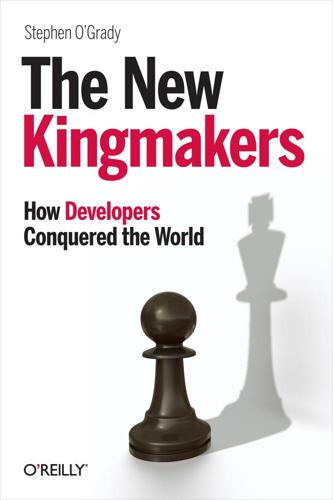
The New Kingmakers
by
Stephen O'Grady
Published 14 Mar 2013
Not just technology businesses: all businesses. Everyone from ESPN to Nike to Sears now offers APIs. Why? Because they recognize that they can’t do it alone, and perhaps because they’re looking at the world around them and seeing that it’s increasingly run by software. As Marc Andreessen noted in his Wall Street Journal op-ed “Why Software is Eating the World,” the world’s largest bookseller (Amazon), largest video service by number of subscribers (Netflix), most-dominant music companies (Apple, Spotify, and Pandora), fastest-growing entertainment companies (Rovio, Zynga), fastest-growing telecom company (Skype), largest direct marketing company (Google), and best new movie production company (Pixar) are all fundamentally software companies.
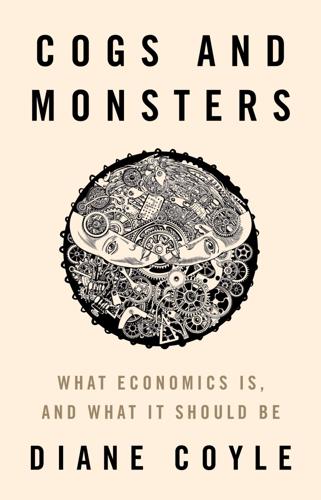
Cogs and Monsters: What Economics Is, and What It Should Be
by
Diane Coyle
Published 11 Oct 2021
Again, there are plenty of old examples of this increasing-returns cost structure, for operating a steel mill or a power generation plant also involves very high fixed costs upfront and far lower marginal costs of producing one extra unit of steel or electricity. Increasing returns are everywhere now, though. Software is eating the world (Andreessen 2011), and software is costly to write and costless to reproduce and distribute. Almost all intangibles incur costs early, from marketing to build a brand to research and development in creation of new medications or treatments. Data itself can have large externalities and scale economies (Coyle et al. 2020).
…
Leape, 2012, ‘What Economists Do and How Universities Might Help’, in Diane Coyle (ed.), What’s the Use of Economics?, London: London Publishing Partnership, 15–20. Anderson, Elizabeth, 1993, Value in Ethics and Economics, Cambridge, MA: Harvard University Press. Andreessen, M., 2011, ‘Why Software Is Eating The World’, Wall Street Journal, August 20, https://www.wsj.com/articles/SB10001424053111903480904576512250915629460. Angrist, Joshua, Pierre Azoulay, Glenn Ellison, Ryan Hill, and Susan Feng Lu, 2020, ‘Inside Job or Deep Impact? Extramural Citations and the Influence of Economic Scholarship’, Journal of Economic Literature, 58 (1), 3–52.
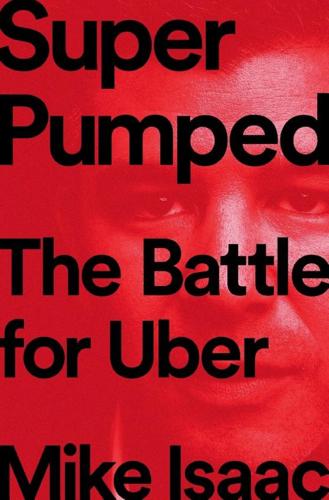
Super Pumped: The Battle for Uber
by
Mike Isaac
Published 2 Sep 2019
Chapter 8: PAS DE DEUX 72 Roughly one third: Artturi Tarjanne, “Why VC’s Seek 10x Returns,” Activist VC Blog (blog), Nexit Adventures, January 12, 2018, http://www.nexitventures.com/blog/vcs-seek-10x-returns/. 74 Kalanick frequently compared: Amir Efrati, “Uber Group’s Visit to Seoul Escort Bar Sparked HR Complaint,” The Information, March 24, 2017, https://www.theinformation.com/articles/uber-groups-visit-to-seoul-escort-bar-sparked-hr-complaint. 75 “Software is eating the world”: Andreessen Horowitz, Software Is Eating the World, https://a16z.com/. 75 deals increased by 73 percent: Richard Florida and Ian Hathaway, “How the Geography of Startups and Innovation Is Changing,” Harvard Business Review, November 27, 2018, https://hbr.org/2018/11/how-the-geography-of-startups-and-innovation-is-changing. 75 billions invested post-2010: Center for American Entrepreneurship, “Rise of the Global Startup City,” Startup Revolution, http://startupsusa.org/global-startup-cities/. 75 emerged as the world’s epicenter: Center for American Entrepreneurship, “Rise of the Global Startup City.” 76 “to organize the world’s information”: “From the Garage to the Googleplex,” About, Google, https://www.google.com/about/our-story/. 76 controversial financial instrument: “The Effects of Dual-Class Ownership on Ordinary Shareholders,” Knowledge@Wharton, June 30, 2004, http://knowledge.wharton.upenn.edu/article/the-effects-of-dual-class-ownership-on-ordinary-shareholders/. 77 “An Owner’s Manual For Google Investors”: Larry Page and Sergey Brin, “2004 Founders’ IPO Letter,” Alphabet Investor Relations, https://abc.xyz/investor/founders-letters/2004/ipo-letter.html. 77 $3.5-billion acquisition: “Snapchat Spurned $3 Billion Acquisition Offer from Facebook,” Digits (blog), Wall Street Journal, November 13, 2013, https://blogs.wsj.com/digits/2013/11/13/snapchat-spurned-3-billion-acquisition-offer-from-facebook/.
…
Using the tools of modern capitalism, they created software companies to improve our lives, while simultaneously wresting power away from lazy elites. The founders became the philosopher kings, the rugged individuals who would save society from bureaucratic, unfair, and outmoded systems. Marc Andreessen famously said, “Software is eating the world.” Back then, technologists thought this was a good thing. Until recently, most of the rest of the world agreed. Venture deals increased by 73 percent from the early 2000s into the 2010s. The amount of global venture capital invested soared from tens of billions in 2005 into the hundreds of billions invested post-2010.
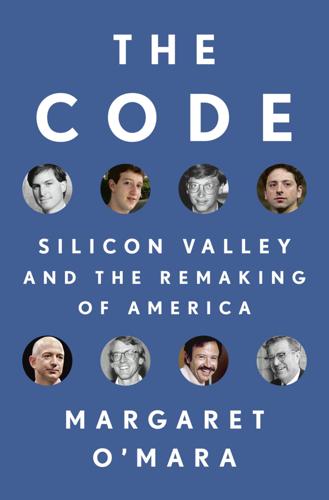
The Code: Silicon Valley and the Remaking of America
by
Margaret O'Mara
Published 8 Jul 2019
Hundreds of places around the world have rebranded themselves Silicon Deserts, Forests, Roundabouts, Steppes, and Wadis as they seek to capture some of the original’s magic. Its rhythms dictate how every other industry works; alter how humans communicate, learn, and collectively mobilize; upend power structures and reinforce many others. As one made-in-the-Valley billionaire, Marc Andreessen, put it a few years back, “software is eating the world.”4 This book is about how we got to that world eaten by software. It’s the seven-decade-long tale of how one verdant little valley in California cracked the code for business success, repeatedly defying premature obituaries to spawn one generation of tech after another, becoming a place that so many others around the world have tried and failed to replicate.
…
And in the years immediately before and after Medvedev’s visit, it made a small group of people in Silicon Valley and Seattle very, very rich. THE POWER OF PLACE By the time Marc Andreessen took to the opinion pages of The Wall Street Journal in the summer of 2011 to pronounce that “software is eating the world,” the new tech platforms were not only altering entire industries. They were transforming the geography of tech as well.4 Across North America and beyond, tech had inhabited a sprawling, suburbanized landscape of research parks and corporate campuses since the age of Eisenhower. It had continued to do so even as other white-collar industries and middle-class residents began returning to denser urban environments at the century’s end.
…
Associated Press, “Apple, Amazon, Facebook, Alphabet, and Microsoft Are Collectively Worth More Than the Entire Economy of the United Kingdom,” April 27, 2018, https://www.inc.com/associated-press/mindblowing-facts-tech-industry-money-amazon-apple-microsoft-facebook-alphabet.html, archived at https://perma.cc/HY68-RJYG [inactive]. 2. Reyner Banham, “Down in the Vale of Chips,” New Society 56, no. 971 (June 25, 1981): 532–33. 3. John Doerr, “The Coach,” interview by John Brockman, 1996, Edge.org, https://www.edge.org/digerati/doerr/, archived at https://perma.cc/9KWX-GLWK. 4. Marc Andreessen, “Why Software Is Eating the World,” The Wall Street Journal, August 20, 2011, C2. Billions of dollars of public investment later, many of the would-be Silicon Somethings have fallen short of original expectations; see Margaret O’Mara, “Silicon Dreams: States, Markets, and the Transnational High-Tech Suburb,” in Making Cities Global: The Transnational Turn in Urban History, ed.
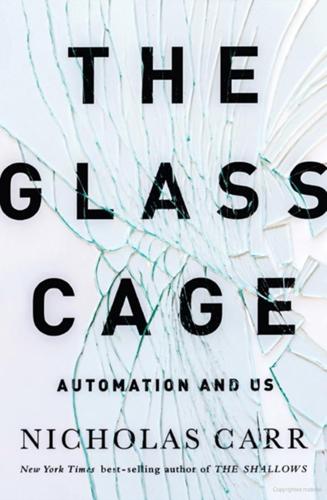
The Glass Cage: Automation and Us
by
Nicholas Carr
Published 28 Sep 2014
Today, as software of what Wiener termed “the judgment-replacing type” moves from our desks to our pockets, we’re at last beginning to experience automation’s true potential for changing what we do and how we do it. Everything is being automated. Or, as Netscape founder and Silicon Valley grandee Marc Andreessen puts it, “software is eating the world.” 48 That may be the most important lesson to be gleaned from Wiener’s work—and, for that matter, from the long, tumultuous history of labor-saving machinery. Technology changes, and it changes more quickly than human beings change. Where computers sprint forward at the pace of Moore’s law, our own innate abilities creep ahead with the tortoise-like tread of Darwin’s law.
…
Knopf, 1984), 67–71. 44.Noble, Forces of Production, 234. 45.Ibid., 21–40. 46.Wiener, Human Use of Human Beings, 148–162. 47.Quoted in Flo Conway and Jim Siegelman, Dark Hero of the Information Age: In Search of Norbert Wiener, the Father of Cybernetics (New York: Basic Books, 2005), 251. 48.Marc Andreessen, “Why Software Is Eating the World,” Wall Street Journal, August 20, 2011. Chapter Three: ON AUTOPILOT 1.The account of the Continental Connection crash draws primarily from the National Transportation Safety Board’s Accident Report AAR-10/01: Loss of Control on Approach, Colgan Air, Inc., Operating as Continental Connection Flight 3407, Bombardier DHC 8-400, N200WQ, Clarence, New York, February 12, 2009 (Washington, D.C.: NTSB, 2010), www.ntsb.gov/doclib/reports/2010/aar1001.pdf.
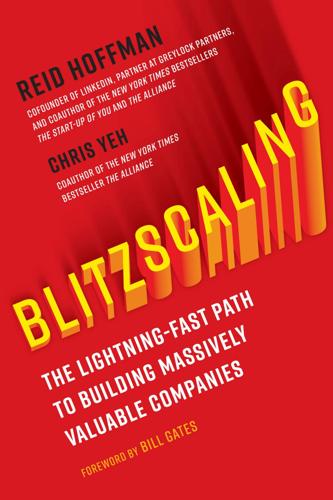
Blitzscaling: The Lightning-Fast Path to Building Massively Valuable Companies
by
Reid Hoffman
and
Chris Yeh
Published 14 Apr 2018
Moreover, the speed and flexibility of software development allow companies to iterate and recover from the inevitable missteps of haste. What’s especially exciting these days is that software and software-enabled companies are starting to dominate industries outside of traditional high tech. My friend Marc Andreessen has argued that “software is eating the world.” What he means is that even industries that focus on physical products (atoms) are integrating with software (bits). Tesla makes cars (atoms), but a software update (bits) can upgrade the acceleration of those cars and add an autopilot overnight. The spread of software and computing into every industry, along with the dense networks that connect us all, means that the lessons of blitzscaling are becoming more relevant and easier to implement, even in mature or low-tech industries.
…
In technology, economics, and the politics of nations, wealth in the form of physical resources is steadily declining in value and significance. The powers of mind are everywhere ascendant over the brute force of things.” Just over twenty years later, in 2011, the venture capitalist (and Netscape cofounder) Marc Andreessen validated Gilder’s thesis in his Wall Street Journal op-ed “Why Software Is Eating the World.” Andreessen pointed out that the world’s largest bookstore (Amazon), video provider (Netflix), recruiter (LinkedIn), and music companies (Apple/Spotify/Pandora) were software companies, and that even “old economy” stalwarts like Walmart and FedEx used software (rather than “things”) to drive their businesses.
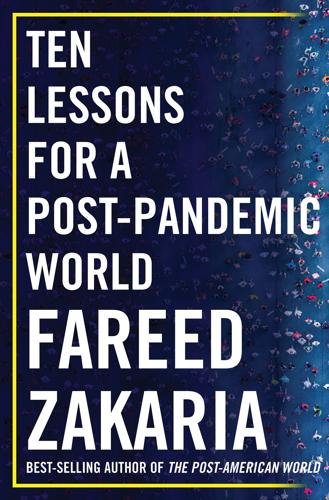
Ten Lessons for a Post-Pandemic World
by
Fareed Zakaria
Published 5 Oct 2020
On August 8, “Black Monday,” the Dow Jones Industrial average dropped 635 points, the sixth-largest drop in its history up to that point. It was in this uneasy environment that Marc Andreessen, the inventor of Mosaic, the first major web browser, published an essay in the Wall Street Journal under a perplexing headline: “Why Software Is Eating the World.” By this point, there were really two economies: the digital economy and the material economy. Andreessen’s point was that the digital economy was becoming so powerful that it was dominating—eating up—the material economy. Increasingly, new companies were finding that they could use software to enhance their profits dramatically, expand their reach, and sell digital services rather than physical products.
…
World Stars Global Equity fund: Irina Ivanova, “Amazon Makes $10,000 Per Second as Shoppers Shelter in Place,” CBS News, Moneywatch, May 1, 2020, https://www.cbsnews.com/news/amazon-q1-earnings-75-billion-10000-per-second/; see also Q1 Amazon net sales of $75.5 billion, $9,709 per second: “Amazon.Com Announces First Quarter Results,” https://s2.q4cdn.com/299287126/files/doc_financials/2020/Q1/Amazon-Q1–2020-Earnings-Release.pdf. 99 over 9%: US Bureau of Labor Statistics, “Unemployment Rate 9.1 Percent in August 2011,” https://www.bls.gov/opub/ted/2011/ted_20110908.htm?view_full. 99 an essay in the Wall Street Journal: Marc Andreessen, “Why Software Is Eating the World,” August 20, 2011. 100 exceeded those of Hollywood and the music business put together: Video game industry revenues = $78 billion in 2010, $137 billion in 2019, see: Will Partin, “The 2010s Were a Banner Decade for Big Money and Tech—and Esports Reaped the Rewards,” Washington Post, January 28, 2020; Hollywood revenue = $42.5 billion in 2019, see: Pamela McClintock, “2019 Global Box Office Revenue Hit Record $42.5B Despite 4 Percent Dip in U.S.,” Hollywood Reporter, January 10, 2020, https://www.hollywoodreporter.com/news/2019-global-box-office-hit-record-425b-4-percent-plunge-us-1268600.
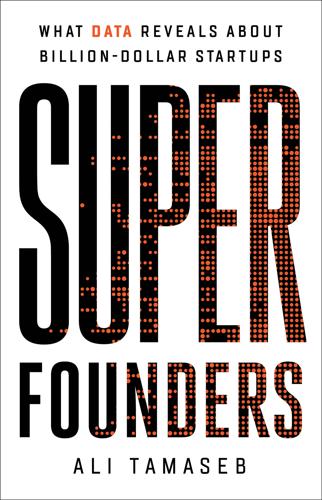
Super Founders: What Data Reveals About Billion-Dollar Startups
by
Ali Tamaseb
Published 14 Sep 2021
Finally, make sure to check in with yourself and your co-founders to determine if you actually are still passionate about building a company in this new market or for this new customer. If you don’t see yourself following your vision for the next ten years, perhaps shutting down and returning investor money, if there’s any left, is a better idea. 7 WHAT AND WHERE? “Software Is Eating the World,” Marc Andreessen famously wrote in the Wall Street Journal in 2011.1 Andreessen, the founder of Netscape and the world-renowned VC firm Andreessen Horowitz, highlighted a number of examples to prove his point: the world’s largest store, Amazon, was a software company; everyone was watching movies on Netflix; and the dominant music companies were iTunes, Spotify, and Pandora—all software makers.
…
,” Quora, January 11, 2011, www.quora.com/What-is-the-genesis-of-Instagram. 5. Sarah Guo, “The Only Question That Matters: Do We Have Product-Market Fit?,” LinkedIn, April 10, 2020, www.linkedin.com/pulse/only-question-matters-do-we-have-product-market-fit-sarah-guo/?articleId=6654505667254202369. CHAPTER 7: WHAT AND WHERE? 1. Marc Andreessen, “Why Software Is Eating the World,” Wall Street Journal, August 20, 2011, www.wsj.com/articles/SB10001424053111903480904576512250915629460. 2. Root Insurance (@rootinsuranceco), “Why Are We Expanding in Columbus—and Not Somewhere Else?,” Twitter, May 21, 2018, 5:06 p.m., https://twitter.com/rootinsuranceco/status/998716673980018688. 3.
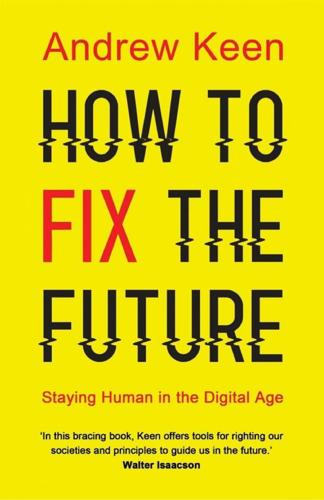
How to Fix the Future: Staying Human in the Digital Age
by
Andrew Keen
Published 1 Mar 2018
It’s a much more lavish meal than just Facebook swallowing journalism, I suggested. Corporations like Google and Facebook were once known, rather quaintly, as “internet” companies. But today they are rapidly becoming artificial intelligence companies and self-driving car companies and virtual reality companies. “Software is eating the world,” is how Marc Andreessen—the cofounder in 1994 of the first internet browser company Netscape and the original boy king of Silicon Valley—describes the way in which networked technology is feeding on almost everything and everyone else. Silicon Valley isn’t just the new Wall Street—it’s actually wealthier and more powerful than the old Wall Street, outspending the financial industry by two to one in Washington, DC, lobbying during the Obama administration’s eight years.35 Yes, we’ve seen this before.
…
In the automotive industry, for example, one of the most pressing challenges for German car manufacturers is to determine where they will fit in the so-called software stack that will empower self-driving vehicles. In a new ecosystem driven, so to speak, by autonomous cars, their challenge is to avoid becoming the dumb commodified hardware at the bottom of the stack in an economy where, as you’ll remember Marc Andreessen saying, software is eating the world. So for Mercedes and BMW, the most dangerous long-term competition now comes from Silicon Valley. Their existential threat is that they could be eaten by Google’s, Tesla’s, or Apple’s algorithms, not by Toyota or Ford cars. In 2013, to hoots of condescending laughter from the digital cognoscenti, Angela Merkel, using language she might have borrowed from More’s Utopia, called the fifty-year-old internet Neuland—meaning “new land” or “uncharted territory.”
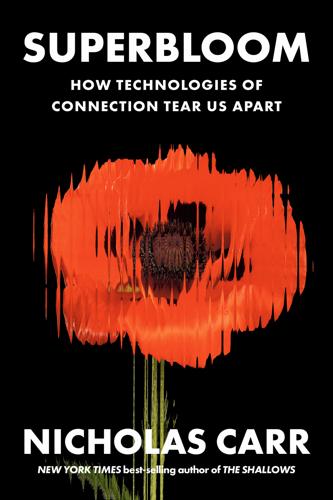
Superbloom: How Technologies of Connection Tear Us Apart
by
Nicholas Carr
Published 28 Jan 2025
Brash, intellectually curious, and hungry for attention, Andreessen relishes his image as Silicon Valley’s resident sage. He routinely issues sweeping, provocative pronouncements in the form of essays, blog posts, and “tweetstorms.” The writings tend toward the bombastic, but they can also be revelatory, illuminating the tech elite’s deepest beliefs and aspirations. “Software is eating the world,” he declared in a 2011 Wall Street Journal op-ed, arguing that computer code was displacing goods and services as the engine of the economy and the font of wealth.1 Programmers would be the new masters of the universe. “AI will save the world,” he wrote in a 2023 manifesto on his company’s blog.
…
We’ll Do Better,” Google Blog, February 23, 2024, https://blog.google/products/gemini/gemini-image-generation-issue/. 42.Andersen, “Inside the Revolution.” 43.Elon Musk, X, November 28, 2022, https://twitter.com/elonmusk/status/1597405399040217088. 44.Angel Eduardo, “Twitter Is No Free Speech Haven under Elon Musk,” FIRE, April 12, 2023. See also Thomas Germain, “Elon Musk, King of Censorship,” Gizmodo, July 13, 2023. 45.Georgia Wells et al., “Musk’s Impulses Remake Twitter,” Wall Street Journal, September 8, 2023. Chapter 9: World without World 1.Marc Andreessen, “Why Software Is Eating the World,” Wall Street Journal, August 20, 2011. 2.Marc Andreessen, “Why AI Will Save the World,” Andreessen Horowitz, June 6, 2023, https://a16z.com/2023/06/06/ai-will-save-the-world/. 3.Niccolo Soldo, “The Dubrovnik Interviews: Marc Andreessen—Interviewed by a Retard,” Substack, May 31, 2021, https://niccolo.substack.com/p/the-dubrovnik-interviews-marc-andreessen.
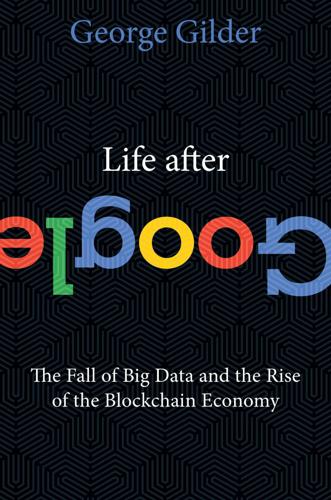
Life After Google: The Fall of Big Data and the Rise of the Blockchain Economy
by
George Gilder
Published 16 Jul 2018
To enable us to better coordinate your addresses in the future, please provide your phone number, your digital image, and your finger print. Thank you. We also would like your mobile number. We value your cooperation. You also might wish to read a number of other books that our algorithm has selected on the basis of the online choices of people like you. These works explain how “software is eating the world,” as the venture capitalist Marc Andreessen has observed, and how Google’s search and other software constitute an “artificial intelligence” (AI) that is nothing less than “the biggest event in human history.” Google AI offers uncanny “deep machine learning” algorithms that startled even its then chairman, Eric Schmidt, by outperforming him and other human beings in identifying cats in videos.
…
The Master Switch: The Rise and Fall of Information Empires revised paperback edition (New York: Vintage Books, 2011). Yockey, Hubert. Information Theory, Evolution, and the Origin of Life (New York: Cambridge University Press, 2005). Periodicals Andreessen, Marc. “Why Bitcoin Matters,” The New York Times, January 21, 2014. Andreessen, Marc. “Why Software is Eating the World,” Wall Street Journal, August 20, 2011. Appelbaum, Binyamin. “Is Bitcoin a Waste of Electricity, or Something Worse?” New York Times, February 28, 2018. Arthur, W. Brian. McKinsey Quarterly, October 2017. Auspitz, Josiah Lee, “The Wasp Leaves the Bottle: Charles Sanders Peirce,” The American Scholar, 2001, 602–19.
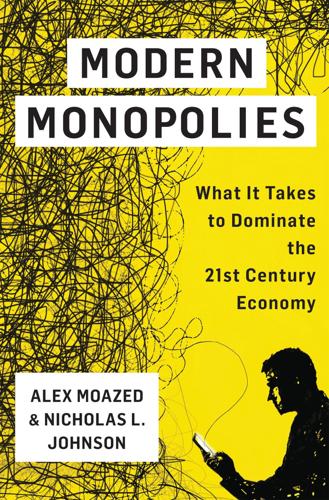
Modern Monopolies: What It Takes to Dominate the 21st Century Economy
by
Alex Moazed
and
Nicholas L. Johnson
Published 30 May 2016
After reading our book, you will have the tools to help your company avoid your own burning platform and thrive in this new era. 1 Platforms Are Eating the World When you truly see networks, it changes the way you plan and strategize. You move differently. —Reid Hoffman, CEO and founder of LinkedIn Software is eating the world. That was the message from former Netscape founder and renowned venture capitalist Marc Andreessen in an op-ed he penned for the Wall Street Journal on August 20, 2011. In it, Andreessen made the case that software companies were about to become a cornerstone of the world economy. “We are in the middle of a dramatic and broad technological and economic shift in which software companies are poised to take over large swathes of the economy,” he wrote.
…
Geller, “Open Letter to BlackBerry Bosses: Senior RIM Exec Tells All as Company Crumbles Around Him,” June 30, 2011, http://bgr.com/2011/06/30/open-letter-to-blackberry-bosses-senior-rim-exec-tells-all-as-company-crumbles-around-him/. 20. Quoted in Hicks, “Research, No Motion.” Chapter 1: Platforms Are Eating the World 1. Marc Andreessen, “Why Software is Eating the World,” Wall Street Journal, August 20, 2011, http://www.wsj.com/articles/SB10001424053111903480904576512250915629460. 2. Danny Wong, “In Q3, Facebook Drove 4X More Traffic than Pinterest,” Shareaholic Reports, October 27, 2014, https://blog.shareaholic.com/social-media-traffic-trends-10-2014/. 3.
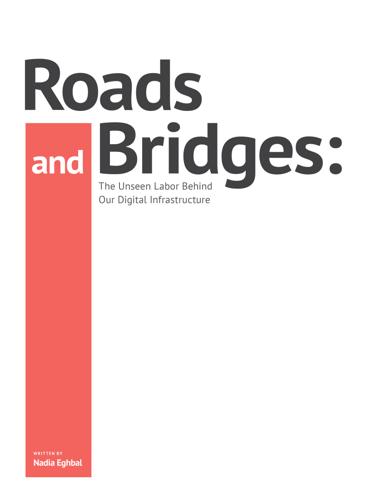
Roads and Bridges
by
Nadia Eghbal
We are lucky that developers have borne the hidden cost of these investments. But their initial investments only get us so far. We are merely at the beginning of the story of how software transformed humanity. Marc Andreessen, the co-founder of Netscape and well-known venture capitalist behind the firm Andreessen Horowitz, observed in 2011 that software is eating the world. [205] Since then, that statement that has become canon for the modern age. Software affects everything we do: not just the frivolous and entertaining, but the mandatory and critical. OpenSSL, the project described at the beginning of this paper, demonstrates this well. In a phone interview, Steve Marquess explained that OpenSSL was used not just by consumer websites, but by the government, drones, satellites, any gadget you hear in the hospital beeping. [206] The Network Time Protocol, maintained by Harlan Stenn, synchronizes the clocks used by billions of networked devices and affects everything with a timestamp: not just messaging apps or email, but financial markets, medical records, and chemical processing.
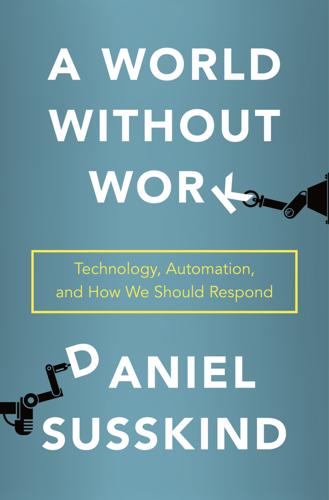
A World Without Work: Technology, Automation, and How We Should Respond
by
Daniel Susskind
Published 14 Jan 2020
But new technologies that reshape our lives will also come from people and institutions well beyond the Big Five. Indeed, point to any part of modern life, and you can be fairly certain that someone, somewhere, is working away in a metaphorical garage, trying to develop a new system or machine to change it. In 2011, the venture capitalist Marc Andreessen wrote that “software is eating the world.”5 In the years since, its appetite has indeed proven voracious. There are very few industries, if any, that new technologies do not find at least partially digestible. All corners of our lives are becoming increasingly digitized; and on top of our world of physical things we are building a parallel world of ones and zeros.
…
For the “43 percent,” see “Amazon Accounts for 43% of US Online Retail Sales,” Business Insider Intelligence, 3 February 2017. 3. Greg Ip, “The Antitrust Case Against Facebook, Google and Amazon,” Wall Street Journal, 16 January 2018. 4. PwC, “Global Top 100 Companies by Market Capitalisation” (2018). 5. Marc Andreessen, “Why Software Is Eating the World,” Wall Street Journal, 20 August 2011. 6. Connie Chan, “When One App Rules Them All: The Case of WeChat and Mobile in China,” Andreessen Horowitz, https://a16z.com/2015/08/06/wechat-china-mobile-first/, quoted in J. Susskind, Future Politics, p. 331. 7. Dan Frommer, “Microsoft Is Smart to Prepare for Its New Role as Underdog,” Quartz, 17 July 2014. 8.
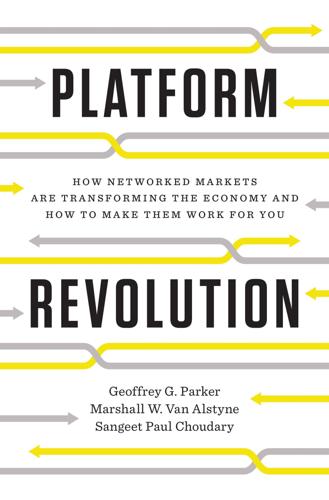
Platform Revolution: How Networked Markets Are Transforming the Economy--And How to Make Them Work for You
by
Sangeet Paul Choudary
,
Marshall W. van Alstyne
and
Geoffrey G. Parker
Published 27 Mar 2016
If this vision for the next phase of Uber’s growth comes true, the landscape of America may well be rendered unrecognizable.4 And if all that is not enough, consider this observation by Kalanick: “If we can get you a car in five minutes, we can get you anything in five minutes.”5 Anything at all? One wonders what limits can be set on Uber’s disruptive potential. Kalanick seems not to acknowledge any. A CAPSULE HISTORY OF DIGITAL DISRUPTION “Software is eating the world.” The slogan was originally used by Netscape founder Marc Andreessen in the title of a 2011 op-ed article in the Wall Street Journal to encapsulate how technology—particularly the Internet—has transformed the world of business.6 The story of Internet-enabled disruption as we’ve witnessed it so far has occurred in two main stages.
…
Zack Kanter, “How Uber’s Autonomous Cars Will Destroy 10 Million Jobs and Reshape the Economy by 2025,” CBS SF Bay Area, sanfrancisco.cbslocal.com/2015/01/27/how-ubers-autonomous-cars-will-destroy-10-million-jobs-and-reshape-the-economy-by-2025-lyft-google-zack-kanter/. 5. Swisher, “Man and Uber Man.” 6. Marc Andreessen, “Why Software Is Eating the World,” Wall Street Journal, August 20, 2011, http://www.wsj.com/articles/SB10001424053111903480904576512250915629460. 7. Phil Simon, The Age of the Platform: How Amazon, Apple, Facebook, and Google Have Redefined Business (Henderson, NV: Motion Publishing, 2011). 8. Feng Zhu and Marco Iansiti, “Entry into Platform-Based Markets,” Strategic Management Journal 33, no. 1 (2012): 88–106. 9.
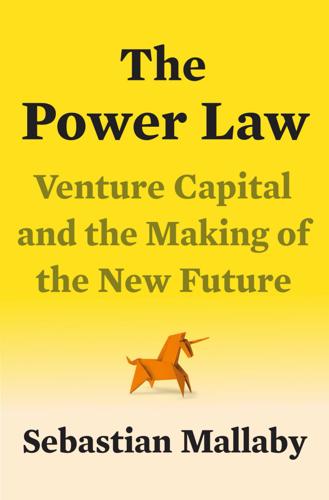
The Power Law: Venture Capital and the Making of the New Future
by
Sebastian Mallaby
Published 1 Feb 2022
The firm launched at the start of a decade-long boom in equities, and especially in software firms; the advent of smartphones, cloud computing, and ubiquitous broadband ushered in a golden age for coders. Two strong partners with computer science backgrounds were ideally placed to capitalize on this moment, and they happily announced this fact. “Software is eating the world,” Andreessen proclaimed in a Wall Street Journal essay. The phrase brilliantly summed up the times. It surely explained more of a16z’s success than the public-relations hype about a new approach to technical founders. But the early years of a16z did feature a stealth innovation—one that was largely left out of the PR blitz.
…
Worldwide, a mere twenty-five million coders—one-third of 1 percent of the global population—were writing all the software that was transforming modern life. Anything that boosted the productivity of this small tribe would be immensely valuable. Predating Marc Andreessen’s declaration that “software is eating the world,” this last prepared-mind exercise became the springboard for a raft of Sequoia investments: Unity, a software development platform for 3-D movies and games; MongoDB, a database company; and GitHub, the leading repository for open-source code. By late 2020, Sequoia’s stakes in these three firms were worth a combined $9 billion.
…
See also Y Combinator Seeq, 106, 107 Sematech, 94, 430n SenseTime, 393–95, 400 Sentry Towers, 403 September 11 attacks (2001), 190–91 Sequoia Capital, 303–38, 454–55n Apple, 83–84, 85–86, 90–91, 160–61 application of behavioral science to venture capital, 309–11 Atari, 62–63, 64–66, 80 Botha and, 305–8, 309–11, 313–14 China business, 225, 238–48, 321 Cisco, 113–19, 131, 158, 161, 434n Company Design Program, 311–12 Facebook, 194–96, 207, 258 founding of, 60–62, 337–38 fundraising, 61–62, 92, 394 Google, 179, 181–83, 190, 382 growth funds, 324–30, 347 hedge funds, 331–33 Heritage funds, 321, 333–36 India business, 321–24 Kleiner Perkins compared with, 303–4 Plaxo, 197 scouts program, 311, 316, 455n Seeq-3Com alliance, 106, 107 Stripe, 317–20 success formula of, 304–6, 307, 312–16, 377–78 team building, 307–8 Uber, 352 Webvan, 178 WeWork, 347–48 WhatsApp, 314 X.com, 201–7 Yahoo, 150–54, 155–56, 160–61, 170, 173 Sequoia Capital Global Equities, 331–33 Sequoia China, 225, 238–48, 314, 321, 448n Sequoia India, 321–24, 326 Series A, 65, 70–71, 140, 160, 189–90, 343, 350, 382 Series B, 71–72, 155–56, 158, 160, 343 Series C, 358–61, 363 Series D, 206, 358, 359 ServiceNow, 326–30 Severino, Paul, 112, 118, 435n sexism, 117, 267–71, 360, 384–85 sexual harassment, 270–71, 365, 367, 384 Shah, Kunal, 322–24 Shanghai, 222–23, 231 Shao, Bo, 447n shareholder capitalism, 189–90 Shaw, George Bernard, 3 Shen, Neil, 224–25, 237–41, 276, 312, 314 background of, 224–25 Ctrip, 237–38, 243, 285 Meituan, 243–48 Shleifer, Scott, 278–88 Sina, Sohu, and NetEase, 279–82 Shockley, William, 17, 21–24, 31–32, 67 Shockley Semiconductor Laboratory, 21–24, 31–33, 41 Traitorous Eight and, 17–18, 21, 25, 28, 31–33, 53, 67, 423n Shopify, 332–33 “short,” 283 Shriram, Ram, 176, 178–79, 180, 182–83, 199, 441n Siara Systems, 9, 10 Sidecar, 358 Sidgmore, John, 142–43, 168 Silicon Alley, 223 Silicon Compilers, 107–8 Silicon Desert, 223 Silicon Forest, 223 Silicon Graphics, 145, 146 Silicon Hills, 223 Silicon Valley, 302–3, 391 competitors vs., 93–96 origin story of, 17–21 Saxenian’s thesis on, 94–96, 389–90 Silver Lake Partners, 289, 297–98 Simon Personal Communicator, 20 Sina, 226, 233, 279–82 Singh, Shailendra, 321–24 Singleton, Henry, 53–54 SixDegrees.com, 20 Skype, 399 Accel Capital’s investment, 191, 251–52, 285–86 Andreessen Horowitz’s investment, 297–98 eBay acquisition of, 191, 297, 448n Silver Lake and, 297–98 Slack, 451n Slim, Carlos, 341 Small Business Investment Companies (SBICs), 41–43, 52, 61, 80, 395, 421–22n Smith, Hank, 86–87, 90 Snowflake, 330 Snow-Job, 69 social impact, 14–15 social networks. See networks SoftBank, 154–60, 171, 334 Alibaba, 229–31 Uber, 370–71 Webvan, 178 WeWork, 346–49, 370–73 Yahoo, 155–60 “software is eating the world,” 296, 309 Sohu, 226, 233, 279–82 Son, Masayoshi, 154–60, 171, 439n Alibaba investment, 229–31, 377, 446n background of, 154, 438n blitzscaling and, 387–88 “crazier, faster, bigger,” 348, 373, 385 Rieschel and, 222, 446n Uber investment, 370–71 Vision Fund, 155, 346–47, 459n WeWork investment, 346–49, 370–73 Yahoo investment, 155–60, 175, 277, 348, 439n Sony, 94 Soros, George, 199, 212–13, 283, 445n Soviet Union, 41, 289 SPAC (special purpose acquisition company), 373–74 SpaceX, 12, 214–15, 403 SPARC (Scalable Processor Architecture), 107 specialization, 129–31 Spectrum Equity, 439n Sperling, Scott, 126–27 Spotify, 289, 399 “spread,” 336 Sputnik, 41 Square, 313 Squarzini, Joe, 139–41 SRI International, 433n stage-by-stage financing, 60, 76–77, 80, 81 Standard and Poor’s 500 (S&P 500), 8–9, 25, 26, 64, 79, 298, 299, 333, 337 Stanford Business School, 5, 163, 305 Stanford Law School, 199, 208 Stanford Review, 199 Stanford University, 2, 17, 18, 96, 110–11, 199, 334, 340 Starbucks, 163, 170, 273–74 Stephens, Trae, 403 Stephenson, Tom, 432n Stevens, Cat, 375 Stevens, Mark, 302 Stewart, Martha, 179, 185 Stripe, 317–20, 332, 378, 388, 455n Stross, Randall, 166, 439n Sullivan & Cromwell, 226 Summit Partners, 325–30, 438–39n Sun, Ed, 447n Sun, Glen, 243–44 Sun Microsystems, 5, 51, 107, 123, 174, 186, 265 Supercell, 451n super-voting rights, 344, 346, 359–62, 371 Sutter Hill Ventures, 52, 66–67, 82, 96–97, 98, 102 Qume deal, 66–67, 98, 102, 103, 115, 184, 187–88, 290 Swanson, Bob, 72–78, 428n Swartz, Jim, 128–32.
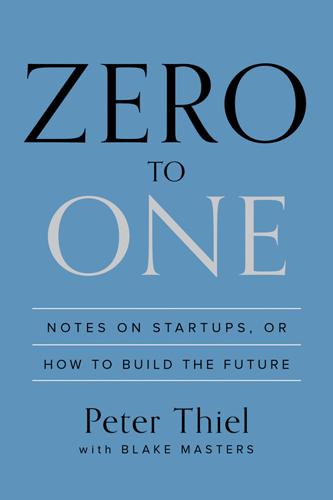
Zero to One: Notes on Startups, or How to Build the Future
by
Peter Thiel
and
Blake Masters
Published 15 Sep 2014
Dale Earnhardt Jr. needn’t feel threatened by them, but the Guardian worries (on behalf of the millions of chauffeurs and cabbies in the world) that self-driving cars “could drive the next wave of unemployment.” Everyone expects computers to do more in the future—so much more that some wonder: 30 years from now, will there be anything left for people to do? “Software is eating the world,” venture capitalist Marc Andreessen has announced with a tone of inevitability. VC Andy Kessler sounds almost gleeful when he explains that the best way to create productivity is “to get rid of people.” Forbes captured a more anxious attitude when it asked readers: Will a machine replace you?
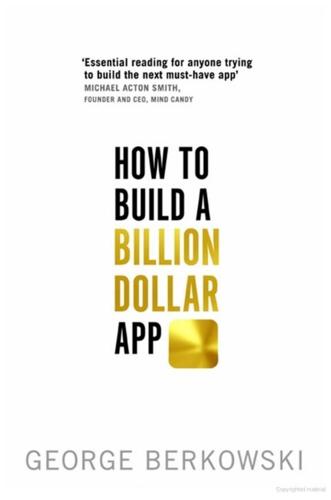
How to Build a Billion Dollar App: Discover the Secrets of the Most Successful Entrepreneurs of Our Time
by
George Berkowski
Published 3 Sep 2014
Ford Motors picked up an in-car music app startup called Livio.23 And there are plenty more examples. There’s even a newer startup that helps broker introductions between startups and acquirers, called Exitround. It has seen strong interest in non-tech corporations joining the marketplace and actively seeking acquisitions. ‘Their main motivation is realising that software is eating the world, and they have to add software talent and technologies to their products,’ explains Exitround founder Jacob Mullins.24 Mullins says that 20 per cent of acquirers on his site are public companies and 10 per cent of those are Fortune 500 companies. All this is great news for entrepreneurs – it can only create a more dynamic and exciting set of exit possibilities.
…
, article on Forbes.com, 8 July 2013, www.forbes.com/sites/cherylsnappconner/2013/06/08/facebooks-reality-check-death-by-a-thousand-snapchats/. 17 Kara Swisher, ‘Yahoo Tumblrs for Cool: Board Approves $1.1 Billion Deal as Expected’, article on AllThingsD.com, 19 May 2013, allthingsd.com/20130519/yahoo-tumblrs-for-cool-board-approves-1-1-billion-deal/. 18 Todd Wasserman, ‘Tumblr’s Mobile Traffic May Overtake Desktop Traffic This Year’, article on Mashable.com, 21 February 2013, mashable.com/2013/02/21/tumblr-mobile-traffic/. 19 Ibid. 20 Marc Andreessen, ‘Why Software Is Eating the World’, article on WSJ.com, 20 August 2011, online.wsj.com/news/articles/ SB10001424053111903480 904576512250915629460. 21 Leena Rao, ‘As Software Eats the World, Non-Tech Corporations Are Eating Startups’, article on TechCrunch.com, 14 December 2013, TechCrunch.com/2013/12/14/as-software-eats-the-world-non-tech-corporations-are-eating-startups/. 22 Alexia Tsotsis, ‘Monsanto Buys Weather Big Data Company Climate Corporation for Around $1.1B’, article on TechCrunch.com, 2 October 2013, TechCrunch.com/2013/10/02/monsanto-acquires-weather-big-data-company-climate-corporation-for-930m/. 23 Leena Rao, 14 December 2013, op. cit. 24 Ibid. 25 Pitchbook, US, ‘VC Valuations and Trends’, 2014 annual report. 26 ‘Yesterday’s Big Payday for the IRS: 1600 Twitter Employees Now Millionaires’, research on PrivCo.com, 8 November 2013, www.privco.com/the-twitter-mafia-and-yesterdays-big-irs-payday. 27 Sven Grundberg, ‘“Candy Crush Saga” Maker Files for an IPO’, article on WSJ.com, 18 February 2014, online.wsj.com/news/articles/SB10001424052702304675504579390580161044024. 28 ‘UK Mobile Games Maker King Delays IPO Due to Candy Crush Surge’, article on VCPost.com, 9 December 2013, www.vcpost.com/articles/19437/20131209/uk-mobile-games-maker-king-delays-ipo-due-candy-crush.htm. 29 Phillipa Leighton-Jones, ‘Why Candy Crush Is a Success That’s Hard to Copy’, blog post on WSJ.com, 18 February 2014, blogs.wsj.com/money-beat/2014/02/18/why-candy-crush-is-a-success-that-cannot-be-copied/. 30 Mark Berniker and Josh Lipton, ‘Uber CEO Kalanick: No Plans To Go Public Right Now’, article on CNBC.com, 6 November 2013, www.cnbc.com/id/101175342.
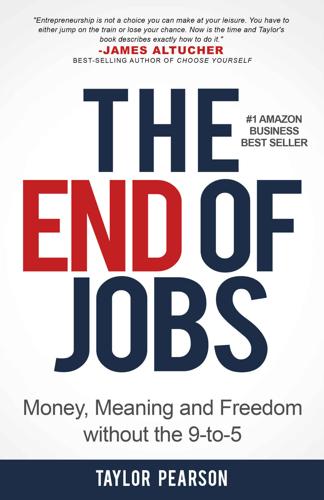
The End of Jobs: Money, Meaning and Freedom Without the 9-To-5
by
Taylor Pearson
Published 27 Jun 2015
Your Middle Class existence isn’t just being squeezed by overseas workers, it’s being squeezed by technology being developed just down the street. 2 The Acceleration of Technology All That Is Old Is New Again Venture capitalist firms are famous for their investment theses, the basic premise that fuels their investing strategy. These are simple statements which result in the investment of billions of dollars. Andreessen-Horowitz, a Venture capital firm started by Marc Andreessen and Ben Horowitz, that manages $4 billion as of March 2014, operates on an investment thesis of five words: Software is Eating the World. What is so profound in those five words that it directs how they invest billions of dollars? The trend Andreessen Horowitz is betting on may seem new and disruptive, but it’s just the next step in a well-understood process that’s been happening for hundreds of years: technological innovation.
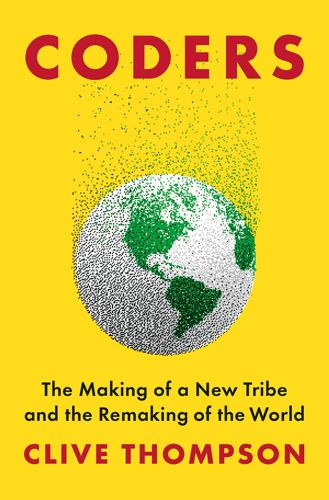
Coders: The Making of a New Tribe and the Remaking of the World
by
Clive Thompson
Published 26 Mar 2019
It was, when I look back on it now, a strikingly naive conversation, on their part and mine. And this points to some of the enormous challenges that tech companies pose for civic life, as the code they weave changes, inexorably, the way society works—including in ways the creators struggle to foresee. I could say, again, that software is eating the world, though it might be more accurate at this point to say it’s “digesting” it. But what’s noticeable also is the fact that size matters. These days, some of the biggest civic impacts come from the truly titanic, globe-spanning tech companies that sit in the midst of our social and economic life.
…
what you already “liked”: Clive Thompson, “Social Networks Must Face Up to Their Political Impact,” Wired, February 5, 2017, accessed August 18, 2018, https://www.wired.com/2017/01/social-networks-must-face-political-impact. “divisiveness and isolation”: Mark Zuckerberg, “Building Global Community,” Facebook, February 16, 2017, accessed August 18, 2018, https://www.facebook.com/notes/mark-zuckerberg/building-global-community/10154544292806634/. “eating the world”: Marc Andreessen, “Why Software Is Eating the World,” Wall Street Journal, August 20, 2011, accessed August 18, 2018, https://www.wsj.com/articles/SB10001424053111903480904576512250915629460. trained machine learning: John Morris, “How Facebook Scales AI,” ZDNet, June 6, 2018, accessed August 18, 2018, https://www.zdnet.com/article/how-facebook-scales-ai/.
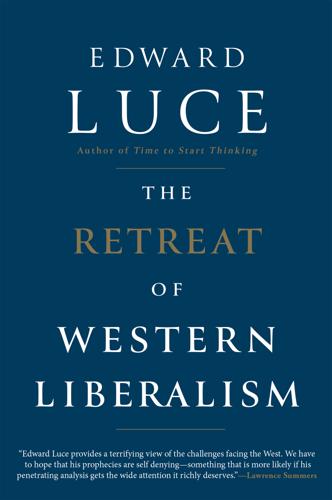
The Retreat of Western Liberalism
by
Edward Luce
Published 20 Apr 2017
In some respects it has already arrived. Over the last twenty years, India and the Philippines reaped the rewards of the telecoms revolution to create lower-skilled service sector jobs at call centres, and on technology helpdesks. Those jobs are now under threat. As the venture capitalist Marc Andreessen says, ‘Software is eating the world’. How many times have you talked to a computer recently, rather than someone with an Indian accent? A lot more than a few years ago, I would guess. Automated voice software is supplanting humans. India is thus being forced to upgrade. Its next generation of offshore jobs will be devoted to far more complex tasks, such as providing medical diagnoses, writing legal briefs, remotely supervising factories and plants, and doing consumer data analysis.
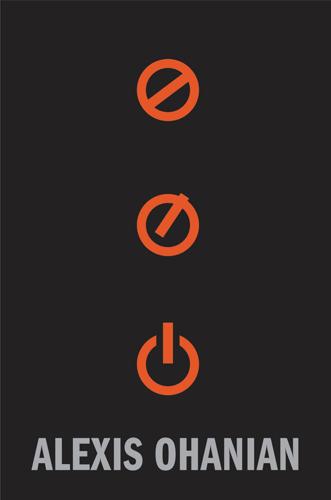
Without Their Permission: How the 21st Century Will Be Made, Not Managed
by
Alexis Ohanian
Published 30 Sep 2013
You’ll notice he’s black and white, which makes this book a guide for navigating the Internet age successfully as well as a coloring book! What a deal! The Real Introduction to My Book The World Isn’t Flat; the World Wide Web Is In an August 20, 2011, op-ed piece for The Wall Street Journal, world-renowned venture capitalist and tech entrepreneur Marc Andreessen declared that “software is eating the world.”1 I couldn’t have said it better myself. Andreessen sets the stage: “With lower startup costs and a vastly expanded market for online services, the result is a global economy that for the first time will be fully digitally wired—the dream of every cyber-visionary of the early 1990s, finally delivered, a full generation later.”
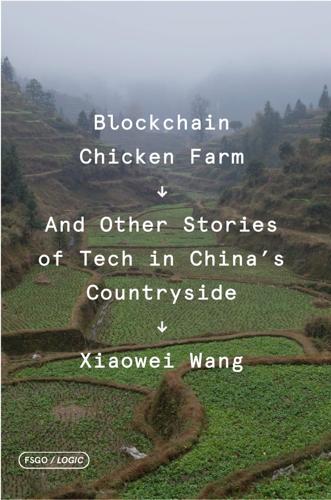
Blockchain Chicken Farm: And Other Stories of Tech in China's Countryside
by
Xiaowei Wang
Published 12 Oct 2020
The Alibaba Research Institute’s rural researchers continue to monitor manufacturing costs throughout the Chinese countryside as well as in the United States, citing the extensive investment Chinese companies are now undertaking in revitalizing rural American towns. Before I left his shop, the disgruntled shoe manufacturer kept saying, “It’s all a scam.” His words had the solemnity of a mantra. How to Eat the World “Software is eating the world,” declared Marc Andreessen in 2011, and in a sense, he was right. In a time of crisis, software has increasingly become the answer to help us build and support more efficient systems. The software industry has also been responsible for enormous inequality by accelerating other industries like rare earth mining and gig work.
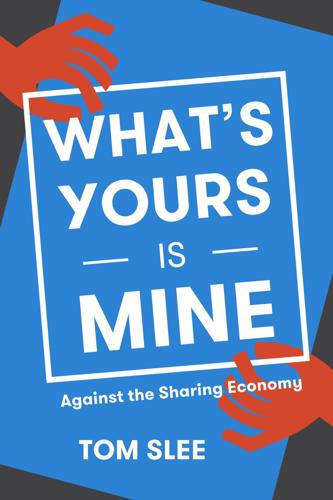
What's Yours Is Mine: Against the Sharing Economy
by
Tom Slee
Published 18 Nov 2015
Companies see themselves as enlightened participants in these debates, with a social mandate as well as a business mandate; Google’s “Don’t be evil” mantra encapsulates their belief that the company has a moral mission as well as a technological one. Internet culture is also supremely ambitious and self-confident. It’s a confidence captured in venture capitalist Marc Andreessen’s saying that “software is eating the world.” In its outer reaches it is an ambition manifested in ideas of Seasteading (a movement to build self-governing floating cities, started by PayPal founder Peter Thiel) and the Singularity (a belief in “the dawning of a new civilization that will enable us to transcend our biological limitations and amplify our creativity,” originating with the ideas of inventor and now Google employee Ray Kurzweil).
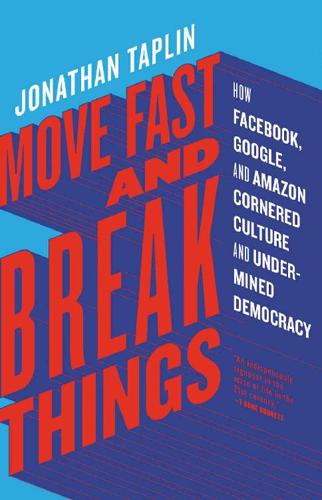
Move Fast and Break Things: How Facebook, Google, and Amazon Cornered Culture and Undermined Democracy
by
Jonathan Taplin
Published 17 Apr 2017
Monopoly, control of our data, and corporate lobbying are at the heart of this story of the battle between creative artists and the Internet giants, but we need to understand that every one of us will stand in the shoes of the artist before long. Musicians and authors were at the barricades first because their industries were the first to be digitized. But as the venture capitalist Marc Andreessen has said, “Software is eating the world,” and soon the technologists will be coming for your job, too, just as they will continue to come for more of your personal data. The rise of the digital giants is directly connected to the fall of the creative industries in our country. I would put the date of the real rise of digital monopolies at August of 2004, when Google raised $1.67 billion in its initial public offering.
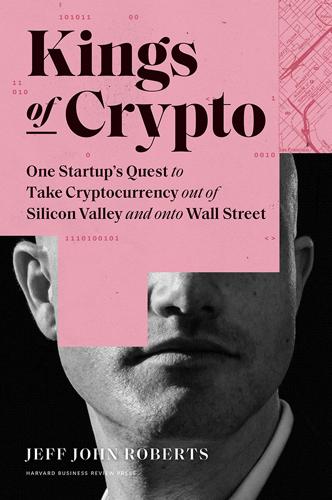
Kings of Crypto: One Startup's Quest to Take Cryptocurrency Out of Silicon Valley and Onto Wall Street
by
Jeff John Roberts
Published 15 Dec 2020
His bosses at Goldman Sachs were old-school Wall Street types who had come up bellowing into telephones and jostling with other men in trading pits. And they didn’t like the new style of trading that was creeping into the finance industry, one that largely rewarded those who wrote the best algorithms. The prophecy of the famous West Coast venture capitalist (and future Coinbase board member) Marc Andreessen, “Software is eating the world,” was coming true. And it was going to swallow up those old-school traders. Even if they didn’t want to admit it. “They called the software engineers ‘IT’ and treated them as second class,” Fred recalls. “They had this aversion to automation. If I wanted to do something that could replace half the trading desk, they didn’t want that.
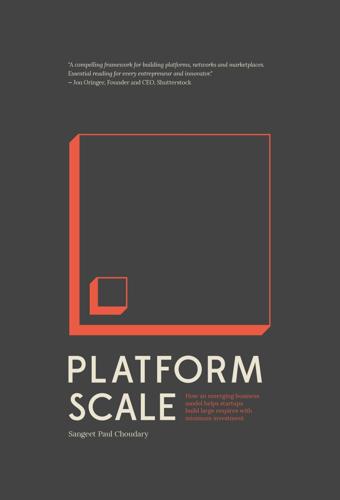
Platform Scale: How an Emerging Business Model Helps Startups Build Large Empires With Minimum Investment
by
Sangeet Paul Choudary
Published 14 Sep 2015
Lyft And Interaction Failure 3.9 Interaction Ownership And The TaskRabbit Problem 4.0 SOLVING CHICKEN-AND-EGG PROBLEMS Introduction 4.1 A Design Pattern For Sparking Interactions 4.2 Activating The Standalone Mode 4.3 How Paypal And Reddit Faked Their Way To Traction 4.4 Every Producer Organizes Their Own Party 4.5 Bringing In The Ladies 4.6 The Curious Case Of New Payment Mechanisms 4.7 Drink Your Own Kool Aid 4.8 Beg, Borrow, Steal And The World Of Supply Proxies 4.9 Disrupting Craigslist 4.10 Starting With Micromarkets 4.11 From Twitter To Tinder 5.0 VIRALITY: SCALE IN A NETWORKED WORLD Introduction 5.1 Transitioning To Platform Scale 5.2 Instagram’s Moonshot Moment 5.3 Going Viral 5.4 Architecting Diseases 5.5 A Design-First Approach To Viral Growth 5.6 Building Viral Engines 5.7 The Viral Canvas 6.0 REVERSE NETWORK EFFECTS Introduction 6.1 A Scaling Framework For Platforms 6.2 Reverse Network Effects 6.3 Manifestations Of Reverse Network Effects 6.4 Designing The Anti-Viral, Anti-Social Network Epilogue Platform Scale (n): Business scale powered by the ability to leverage and orchestrate a global connected ecosystem of producers and consumers toward efficient value creation and exchange. PREFACE Eating The World In the late summer of 2011, Marc Andreessen, co-founder of Netscape and the venture capital firm Andreessen-Horowitz, opined in a Wall Street Journal op-ed that “software is eating the world.” Andreessen was referring to firms like Amazon and Google that displace traditional industry leaders with new business models. Ever since, the phrase has become a rallying cry for every new startup hoping to build the next big thing. Software has been around for several decades now, but its ability to “eat” the world – to disrupt and reorganize traditional industries – has become most apparent over the last decade and a half.
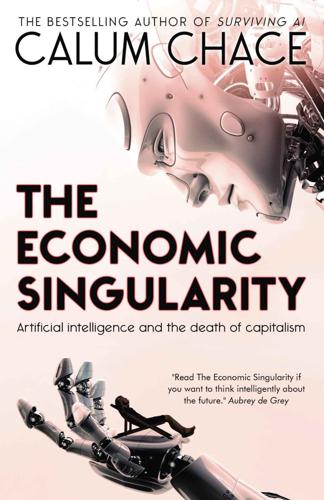
The Economic Singularity: Artificial Intelligence and the Death of Capitalism
by
Calum Chace
Published 17 Jul 2016
If the insured parties are Google and a handful of massive competitors, then the negotiating position of the insurance companies will deteriorate sharply from the present situation where they are “negotiating” with you and me. Warren Buffet ascribes some of his enormous success as the world's best-known investor to his decision to avoid areas he does not understand, including industries based on IT. He has massive holdings in the insurance industry. Unfortunately for him, software is “eating the world”,[cciv] and a large chunk of the insurance industry is about to be engulfed in rapid technological change. Buffet acknowledges that when self-driving cars are established, the insurance industry will look very different, almost certainly with fewer and smaller players.[ccv] It is very hard to say which of today's players will be the winners and losers.
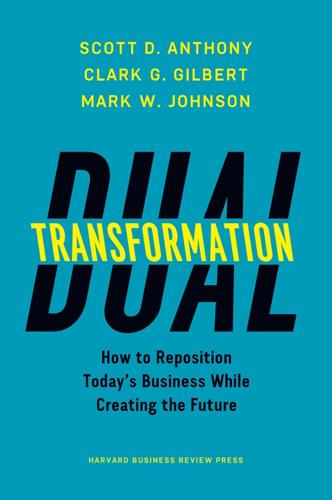
Dual Transformation: How to Reposition Today's Business While Creating the Future
by
Scott D. Anthony
and
Mark W. Johnson
Published 27 Mar 2017
In a few years the firm became one of the most influential in Silicon Valley, investing in companies like Twitter, Airbnb, Jawbone, Oculus VR, and many more. In a piece in the Wall Street Journal in 2011, Andreessen summarized one of his key investment theses with a phrase that rings true to entrepreneurs and executives of companies under disruptive assault: “Software is eating the world.” The first paragraph of a widely shared article in 2015 on TechCrunch summed up the powerful pull of software-based platforms: “Uber, the world’s largest taxi company, owns no vehicles. Facebook, the world’s most popular media owner, creates no content. Alibaba, the most valuable retailer, has no inventory.
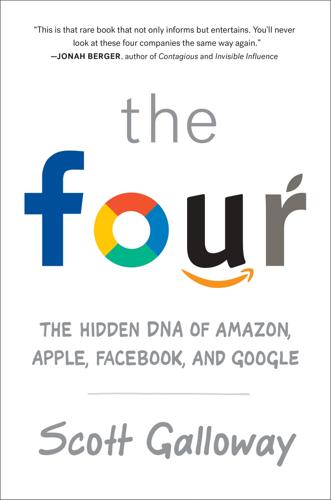
The Four: How Amazon, Apple, Facebook, and Google Divided and Conquered the World
by
Scott Galloway
Published 2 Oct 2017
Three of the Four Horsemen—Apple, Facebook, and Google—have outstanding relationships with, and are a bike ride away from, a world-class engineering university, Stanford, and short drive to another, UC Berkeley (ranked #2 and #3, respectively).12 Many would argue the University of Washington (Amazon) is in the same weight class (#23). To be an accelerant you must have the raw material. Just as you used to build the electricity plant near the coal mine, the raw material today is top engineering, business, and liberal arts graduates. Tech—software—is eating the world. You need builders, people who can program software, and who have a sense for the intersection of tech and something that adds value to the enterprise and/or the consumer. The best engineers and managers for that task come from, in greater proportions, the best universities. In addition, two-thirds of the world’s GDP growth over the next fifty years will occur in cities.
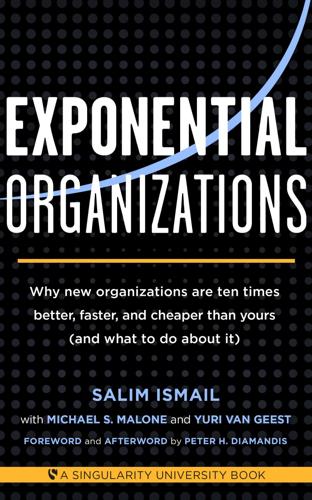
Exponential Organizations: Why New Organizations Are Ten Times Better, Faster, and Cheaper Than Yours (And What to Do About It)
by
Salim Ismail
and
Yuri van Geest
Published 17 Oct 2014
Finally, according to Ericsson Research, within the next eight years we will see the next generation of mobile networks (5G) sporting speeds of five gigabits per second. Just imagine what that will make possible. When Marc Andreessen proclaimed in a 2011 Wall Street Journal article that “software is eating the world,” he was addressing this very phenomenon. Andreessen, who helped invent the Internet browser and is now one of Silicon Valley’s most powerful venture capitalists, argued that in every industry, and at every level, software is automating and accelerating the world. Cloud computing and the app store ecosystems are clear testaments to this trend, with the Apple and Android platforms each hosting more than 1.2 million applications programs, most of them crowdsourced from customers.
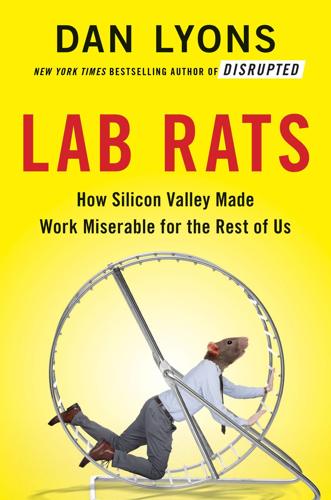
Lab Rats: How Silicon Valley Made Work Miserable for the Rest of Us
by
Dan Lyons
Published 22 Oct 2018
So why do companies keep searching for the fountain of youth, grasping at miracle cures? Right now most of them are scared to death. Their size used to be an advantage, but now it works against them. They’ve seen other companies that once seemed invincible get destroyed by the Internet—Blockbuster, Tower Records, Borders Books. They fear they will be next. “Software is eating the world,” venture capitalist Marc Andreessen once famously said, meaning that tech companies were no longer content to sell computers and software to other industries and instead intended to replace them. The media business has been nuked. Brick-and-mortar retailers are being wiped out so fast that people call it the “retail apocalypse.”
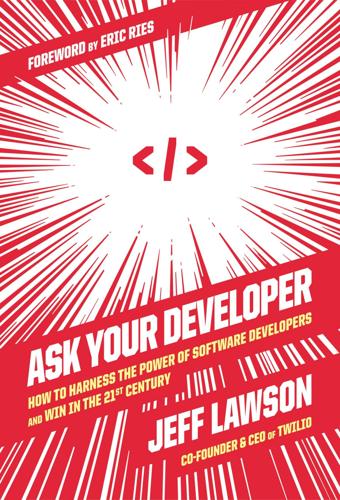
Ask Your Developer: How to Harness the Power of Software Developers and Win in the 21st Century
by
Jeff Lawson
Published 12 Jan 2021
Thus unlocking technical talent is actually the key for businesses of every shape and size to compete in the digital era—so the Ask Your Developer mindset isn’t just a way of making developers feel appreciated, it’s a new way of operating to succeed in the digital economy. When Netscape founder Marc Andreessen wrote “Why Software Is Eating the World” in 2011, he created the catchphrase for the current migration of every business to software. But he didn’t articulate how exactly that would work. In fact, you might believe that just buying software was how this transformation would work. Or that the software would just eat the world on its own in some kind of Terminator-like hellscape.
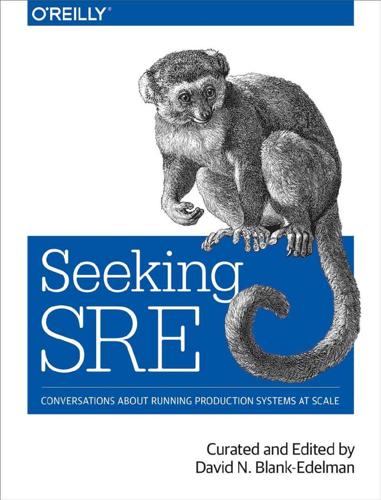
Seeking SRE: Conversations About Running Production Systems at Scale
by
David N. Blank-Edelman
Published 16 Sep 2018
Although the use of the phrase “site up” and even the use of the term “site” within SRE hearkens back to the origins of the SRE practice, SRE work and skills are being employed on a growing basis to keep services, networks, internal and external-facing infrastructure, and products reliable. As “software is eating the world”4 and capabilities that were once the province of custom silicon move to horizontally scaled general-purpose hardware complemented with the right software, SRE practices become more important than chipset design or assembling the right constellation of unique hardware. For the sake of terminology, I will stick with the term “site” (or “website”) in this chapter, but please read that term in a widely inclusive sense.
…
The Fifth Discipline: The Art and Practice of the Learning Organization. London: Random House. 2 Tim O’Reilly, WTF? What’s the Future and Why It’s Up to Us 3 Lecture on “Electrical Units of Measurement” (May 3, 1883), published in Popular Lectures, Vol. I, p. 73. 4 Marc Andreessen [paywall], “Why Software Is Eating The World”, republished at Andreessen Horowitz. 5 Peng Huang, Chuanxiong Guo, Lidong Zhou, Jacob R. Lorch, Yingnong Dang, Murali Chintalapati, Randolph Yao, “Gray Failure: The Achilles’ Heel of Cloud-Scale Systems” 6 Jude Karabus, “BA’s ‘global IT system failure’ was due to ‘power surge’”. 7 Gareth Corfield, “BA IT systems failure: Uninterruptible Power Supply was interrupted”. 8 Cited by John Allspaw: Koen, Billy V. (1985).
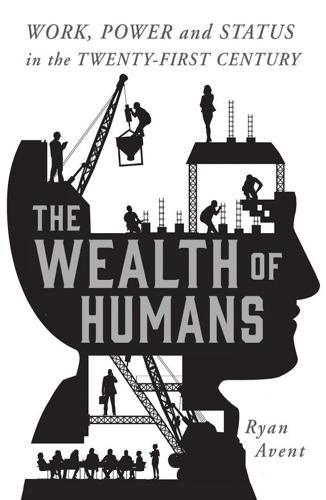
The Wealth of Humans: Work, Power, and Status in the Twenty-First Century
by
Ryan Avent
Published 20 Sep 2016
The cost of cloud computing services continues to tumble, for instance. In the 1990s, at least, macro-economists could count on start-ups to invest their money in big, energy-sucking servers; now they can rent what they need from Amazon or Google at a fraction of the cost. Savings pile up; potential uses do not. Software is eating everything, and the creation of new software requires investments of time and social capital rather than mountains of money for plants and equipment. Capital is required for office space in social-capital-rich cities, however. But because of the continued difficulty in building new office space in such places, rising demand for offices in productive cities mostly pushes up real estate costs: London rent payments by technology firms become additional capital income and capital gains for the very rich, who spend too little of their marginal earnings to keep demand growing rapidly.
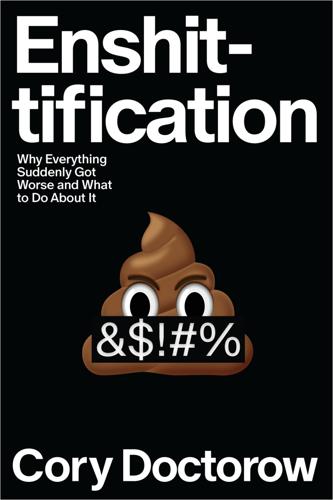
Enshittification: Why Everything Suddenly Got Worse and What to Do About It
by
Cory Doctorow
Published 6 Oct 2025
The only saving grace here is that the cartels operate mostly in hard goods industries, which means that they can’t take advantage of the flexibility that digital platforms use to twiddle their customers and sleaze their way through endless rounds of Darth Vader MBA deal-altering. But that’s changing—due to the second trend. The Trump toady, tech authoritarian, and cryptocurrency hustler Marc Andreessen once famously quipped that “software is eating the world.” Andreessen was (as usual) wrong. Software’s effects are primarily focused at the other end of the world’s alimentary canal: software isn’t eating the world; it’s enshittifying it. A better prophet to listen to is, as ever, William Gibson, each of whose quips is worth a dozen Andreessen aphorisms.
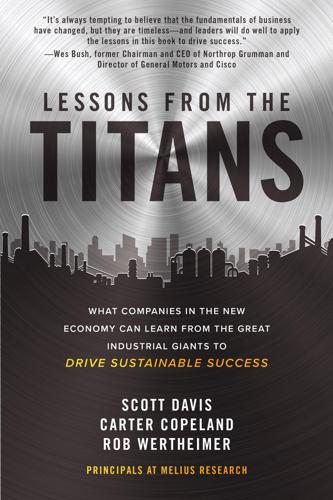
Lessons from the Titans: What Companies in the New Economy Can Learn from the Great Industrial Giants to Drive Sustainable Success
by
Scott Davis
,
Carter Copeland
and
Rob Wertheimer
Published 13 Jul 2020
If this pace of disruption has caught auto leaders or investors by surprise, they most certainly must have been out of touch in more ways than we can imagine. Meanwhile, few expected the computing power we have today and the pervasive impact of the internet and smartphones. Netscape cofounder and Silicon Valley investor Marc Andreessen noted in 2011 that “software is eating the world.” That prediction sure seems accurate. Few could have dreamed of the impact that software has already had. But that prediction was ignored by most and stands out as being unusually prescient. Even the best CEOs are kidding themselves if they think they can consistently predict more than a little bit forward.

Golden Gates: Fighting for Housing in America
by
Conor Dougherty
Published 18 Feb 2020
Most of America was still grappling with what the pundits called “a jobless recovery” (whatever that meant), while the Bay Area lived in a bubble of exuberance and self-satisfaction. Google had just revealed its self-driving car project, Facebook was gearing up to go public, and the venture capitalist Marc Andreessen was coining the phrase “software is eating the world.” Sonja thought it was exciting to live in a place with so much optimism and easy employment, and when she heard people complain about how San Francisco was being murdered by runaway growth, she regarded them as ingrates who didn’t know or didn’t care what places like Philly and St. Louis looked like.
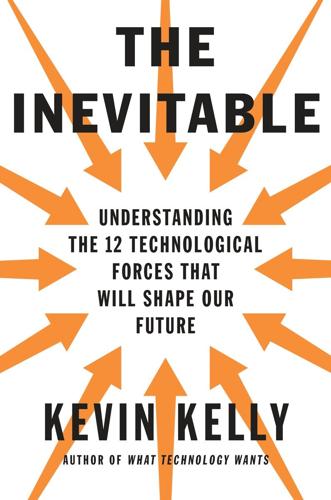
The Inevitable: Understanding the 12 Technological Forces That Will Shape Our Future
by
Kevin Kelly
Published 6 Jun 2016
In 1930 it took only one kilogram: Sylvia Gierlinger and Fridolin Krausmann, “The Physical Economy of the United States of America,” Journal of Industrial Ecology 16, no. 3 (2012): 365–77, Figure 4a. from $1.64 in 1977 to $3.58 in 2000: Figures adjusted for inflation. Ronald Bailey, “Dematerializing the Economy,” Reason.com, September 5, 2001. “Software eats everything”: Marc Andreessen, “Why Software Is Eating the World,” Wall Street Journal, August 20, 2011. Toffler called in 1980 the “prosumer”: Alvin Toffler, The Third Wave (New York: Bantam, 1984). subscribe to Photoshop: “Subscription Products Boost Adobe Fiscal 2Q Results,” Associated Press, June 16, 2015. Uber for laundry: Jessica Pressler, “‘Let’s, Like, Demolish Laundry,’” New York, May 21, 2014.
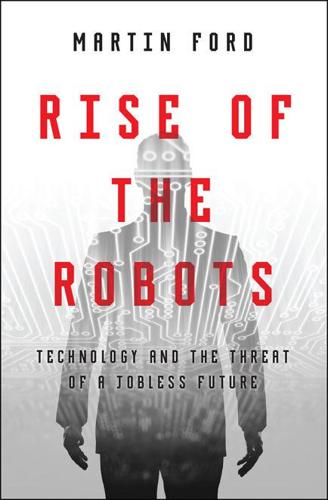
Rise of the Robots: Technology and the Threat of a Jobless Future
by
Martin Ford
Published 4 May 2015
I don’t know what all those other people will do now, but this isn’t work they can do anymore. It’s a winner-takes-all consolidation.”30 The evaporation of thousands of skilled information technology jobs is likely a precursor for a much more wide-ranging impact on knowledge-based employment. As Netscape co-founder and venture capitalist Marc Andreessen famously said, “Software is eating the world.” More often than not, that software will be hosted in the cloud. From that vantage point it will eventually be poised to invade virtually every workplace and swallow up nearly any white-collar job that involves sitting in front of a computer manipulating information. Algorithms on the Frontier If there is one myth regarding computer technology that ought to be swept into the dustbin it is the pervasive believe that computers can do only what they are specifically programmed to do.
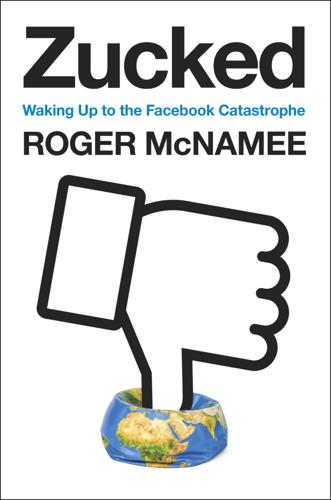
Zucked: Waking Up to the Facebook Catastrophe
by
Roger McNamee
Published 1 Jan 2019
The platforms have also used a variety of techniques to limit would-be competitors’ access to capital. In economic terms, Facebook, Google, and Amazon exploited their economic power to reduce competition. Regulators are reconsidering their hands-off policies. Past bragging by internet platforms—statements like “software is eating the world” and “data is the new oil”—has invited greater scrutiny. User data has value, even if users do not understand that to be the case. We know this because Facebook and Google are two of the most valuable companies ever created, and their businesses are based on monetizing user data. Harm is increasingly evident, and policy makers and regulators are taking notice.
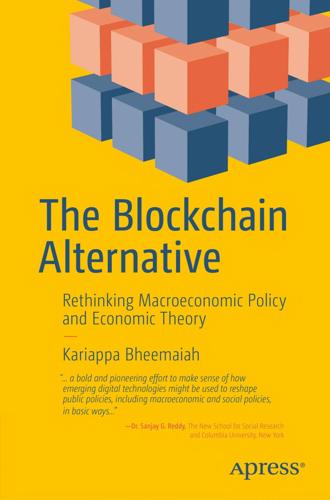
The Blockchain Alternative: Rethinking Macroeconomic Policy and Economic Theory
by
Kariappa Bheemaiah
Published 26 Feb 2017
In the past, technological evolution posed threats to manual jobs. But as machine learning, neural nets, and AI continue to make significant and rapid strides, the threat is now faced by skilled personnel who were employed to perform cognitive tasks (Refer to Sidebar 3-1). As Marc Andreessen said, “Software is eating the world.” Today, software is increasingly threatening anyone whose job function involves a repetitive framework. With automation and financialization posing the biggest risks to industrialized economies, policies are needed that address the changes in productivity gains. Hence, it must be understood by policy makers that we have an ailing self-organized society that needs more direction in order to combat and adapt to the future technological changes.
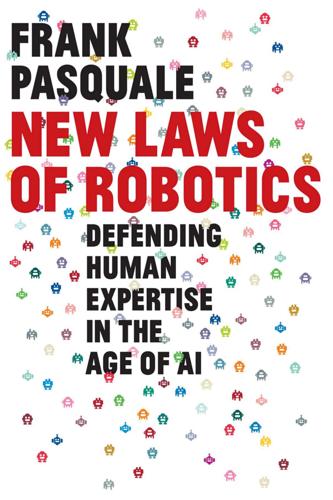
New Laws of Robotics: Defending Human Expertise in the Age of AI
by
Frank Pasquale
Published 14 May 2020
See John Markoff, Machines of Loving Grace (New York: HarperCollins, 2015), which describes pioneering IA work by Doug Engelbart and a long line of proteges. See also Doug Engelbart, Augmenting Human Intellect: A Conceptual Framework (Washington, DC: Air Force Office of Scientific Research, 1962). 30. Marc Andreessen, “Why Software Is Eating the World,” Wall Street Journal, August 20, 2011, https://www.wsj.com/articles/SB10001424053111903480904576512250915629460. 31. Ryan Calo, “Robotics and the Lessons of Cyberlaw,” California Law Review 103, no. 3 (2015): 513–563. 32. Ian Kerr, “Bots, Babes and the Californication of Commerce,” Ottawa Law and Technology Journal 1 (2004): 285–325. 33.
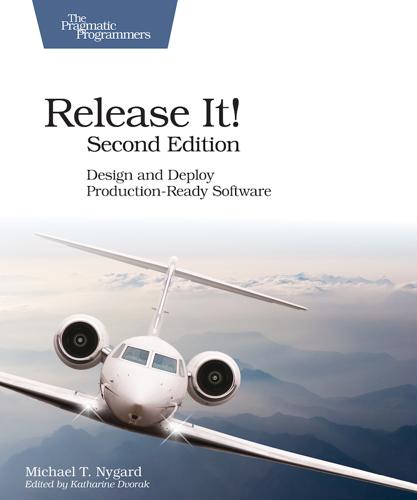
The Nature of Software Development: Keep It Simple, Make It Valuable, Build It Piece by Piece
by
Ron Jeffries
Published 14 Aug 2015
If the site had originally been built the way it is now, the engineers would have been able to join marketing’s party and pop a few champagne corks instead of popping fuses. Footnotes [81] http://www.melconway.com/research/committees.html [82] http://www.arin.net Copyright © 2018, The Pragmatic Bookshelf. Chapter 16 Adaptation Change is guaranteed. Survival is not. You’ve heard the Silicon Valley mantras: “Software is eating the world.” “You’re either disrupting the market or you’re going to be disrupted.” “Move fast and break things.” What do they all have in common? A total focus on change, either on the ability to withstand change or, better yet, the ability to create change. The agile development movement embraced change in response to business conditions.
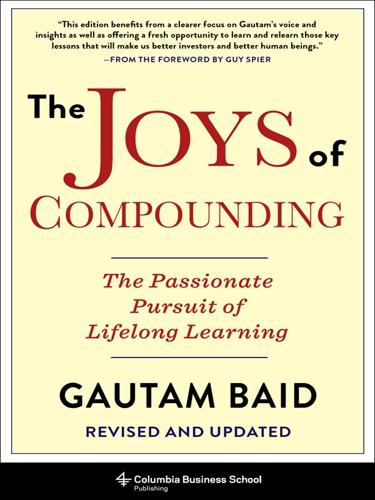
The Joys of Compounding: The Passionate Pursuit of Lifelong Learning, Revised and Updated
by
Gautam Baid
Published 1 Jun 2020
It took decades of toil and sweat, and significant sums of capital, to go around the country and cobble together a network of refineries in the late-nineteenth and early twentieth centuries. It took Mark Zuckerberg just eight years to build Facebook from nothing to a business with $100 billion in valuation—and just four more years to reach $300 billion. The big picture is that software is eating the world—that is, many of the products and services developed over the past 150 years are transforming into, or being disrupted by software…. The implications are enormous; software is infinitely replicable and, through the internet, can be delivered at zero marginal cost. When a major input to business—distribution cost—goes to zero, entire industries get disrupted [emphasis added].
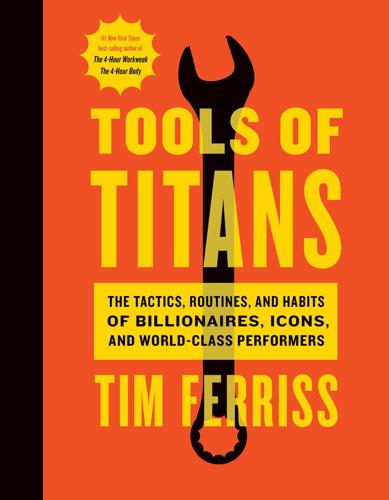
Tools of Titans: The Tactics, Routines, and Habits of Billionaires, Icons, and World-Class Performers
by
Timothy Ferriss
Published 6 Dec 2016
Michael Arrington asked me, “You’ve invested in a lot of great startups, how do you pick your companies?” I responded, “I trust my gut.” He seemed unsatisfied and told me, “You’ve got to come up with something better than that.” I’ve always admired the tech investors who construct a big, overarching thesis to frame their investment philosophy. “Software is eating the world,” “the bottom-up economy,” and “investing in thunder lizards,” to name a few. This type of theme investing is a great strategy for funds, but it never really applied to me as an individual angel investor. For me, the decision to invest in a startup comes after following a process that is heavily weighted towards EQ (emotional quotient).
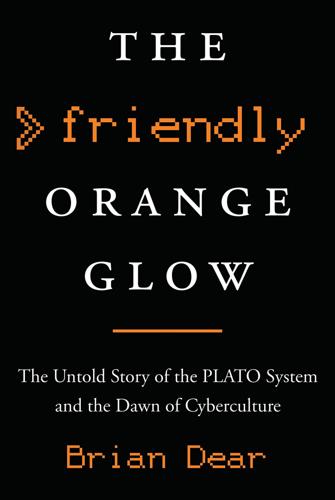
The Friendly Orange Glow: The Untold Story of the PLATO System and the Dawn of Cyberculture
by
Brian Dear
Published 14 Jun 2017
But when Bill talks about educational delivery, what he is really talking about is running the schools….We are on a novel and maybe even revolutionary path. We are after the privatization of one of the largest public services in this country—the privatization of the public schools.” Since that time, the notion no longer seems so outlandish. As Mark Andreessen has famously said, “Software is eating the world.” It seems that big business, including Silicon Valley, is more determined than ever to devour public education and turn it into a monetized business. Whether the passionate, caring, hands-on Mary Graves of the world have a place in a world of private, for-profit schools, no doubt loaded to the hilt with technology, remains to be seen
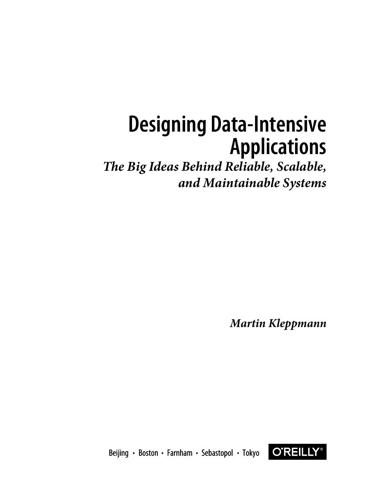
Designing Data-Intensive Applications: The Big Ideas Behind Reliable, Scalable, and Maintainable Systems
by
Martin Kleppmann
Published 17 Apr 2017
Meadows and Diana Wright: Thinking in Systems: A Primer. Chelsea Green Publishing, 2008. ISBN: 978-1-603-58055-7 550 | Chapter 12: The Future of Data Systems [93] Daniel J. Bernstein: “Listening to a ‘big data’/‘data science’ talk,” twitter.com, May 12, 2015. [94] Marc Andreessen: “Why Software Is Eating the World,” The Wall Street Journal, 20 August 2011. [95] J. M. Porup: “‘Internet of Things’ Security Is Hilariously Broken and Getting Worse,” arstechnica.com, January 23, 2016. [96] Bruce Schneier: Data and Goliath: The Hidden Battles to Collect Your Data and Control Your World. W. W. Norton, 2015.
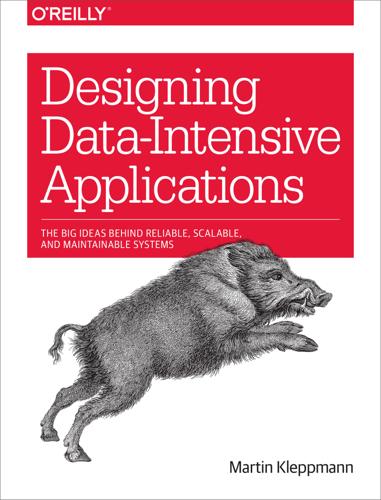
Designing Data-Intensive Applications: The Big Ideas Behind Reliable, Scalable, and Maintainable Systems
by
Martin Kleppmann
Published 16 Mar 2017
theguardian.com, November 10, 2016. [92] Donella H. Meadows and Diana Wright: Thinking in Systems: A Primer. Chelsea Green Publishing, 2008. ISBN: 978-1-603-58055-7 [93] Daniel J. Bernstein: “Listening to a ‘big data’/‘data science’ talk,” twitter.com, May 12, 2015. [94] Marc Andreessen: “Why Software Is Eating the World,” The Wall Street Journal, 20 August 2011. [95] J. M. Porup: “‘Internet of Things’ Security Is Hilariously Broken and Getting Worse,” arstechnica.com, January 23, 2016. [96] Bruce Schneier: Data and Goliath: The Hidden Battles to Collect Your Data and Control Your World. W. W. Norton, 2015.